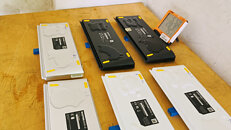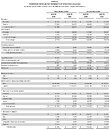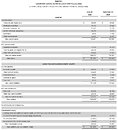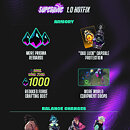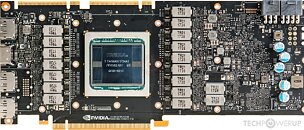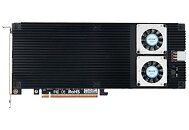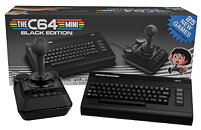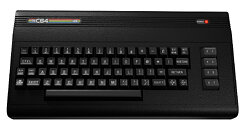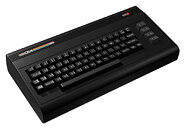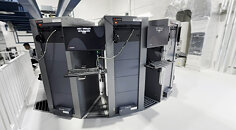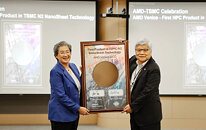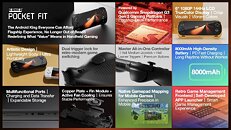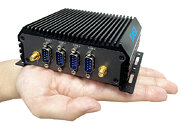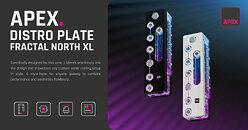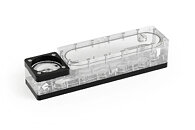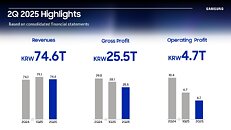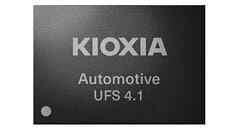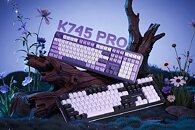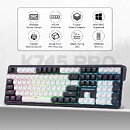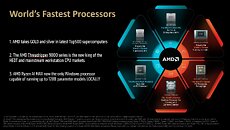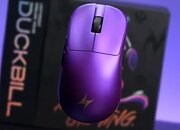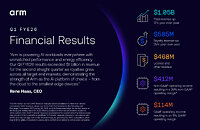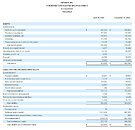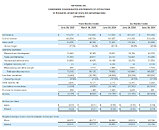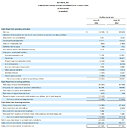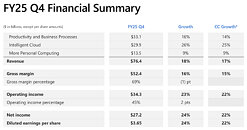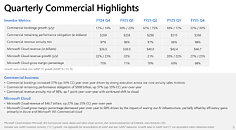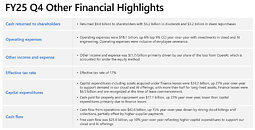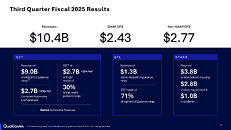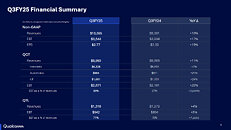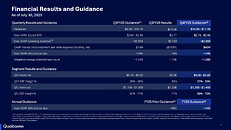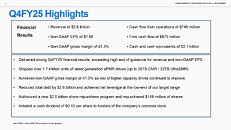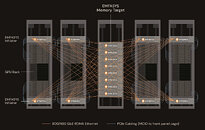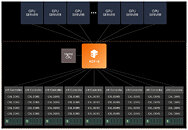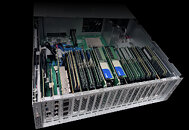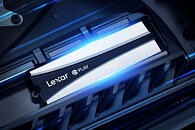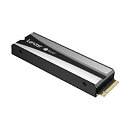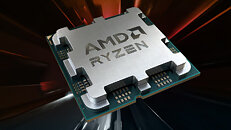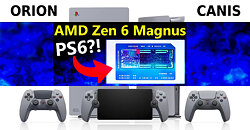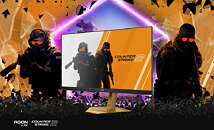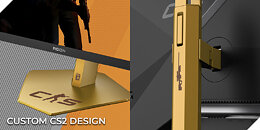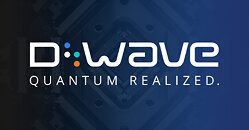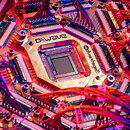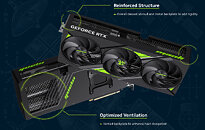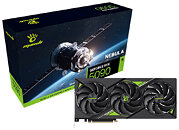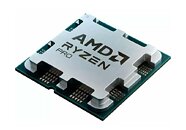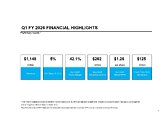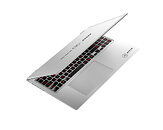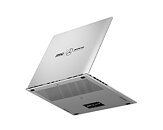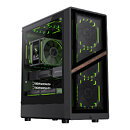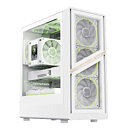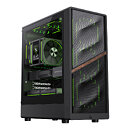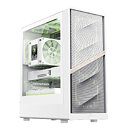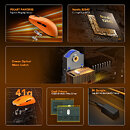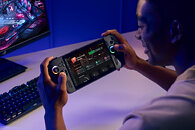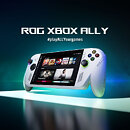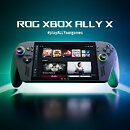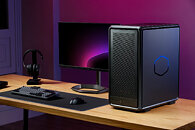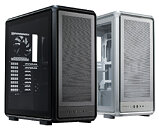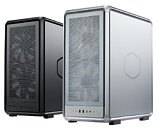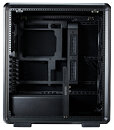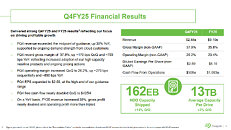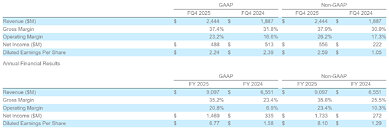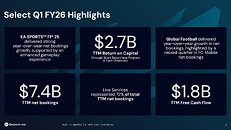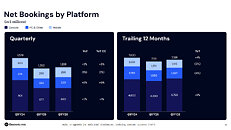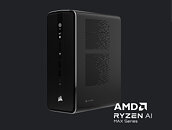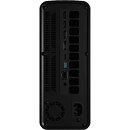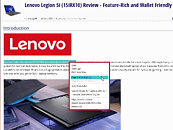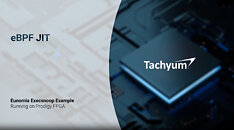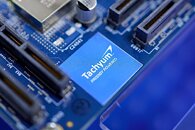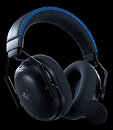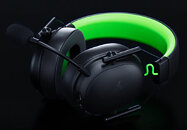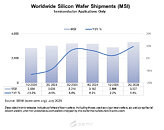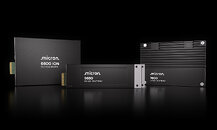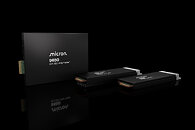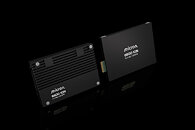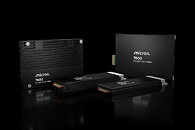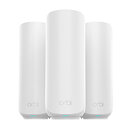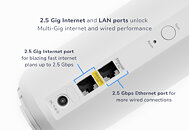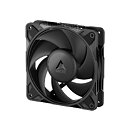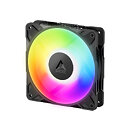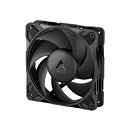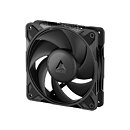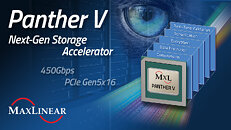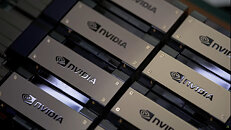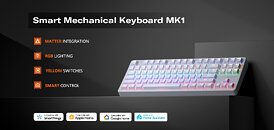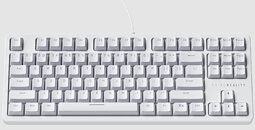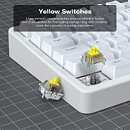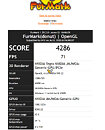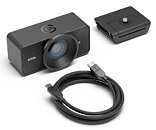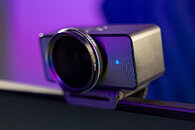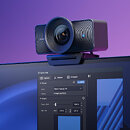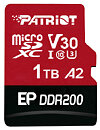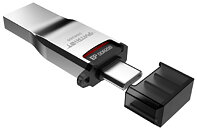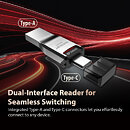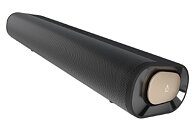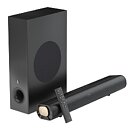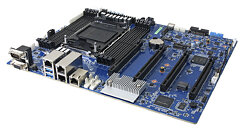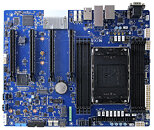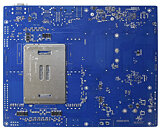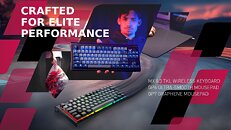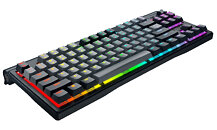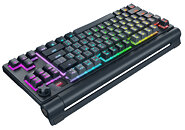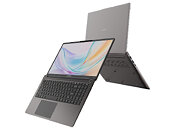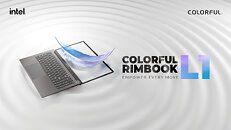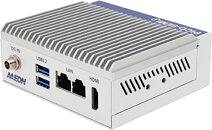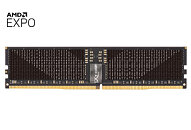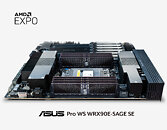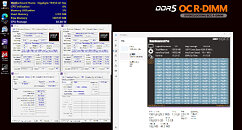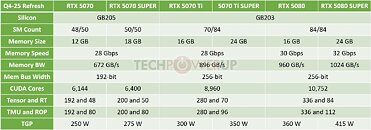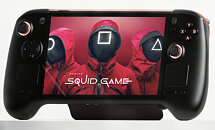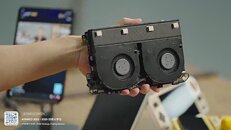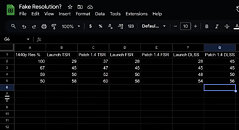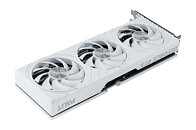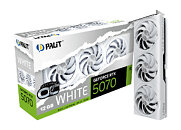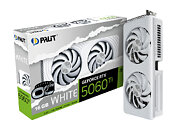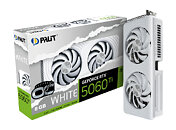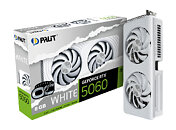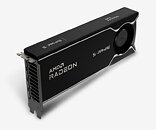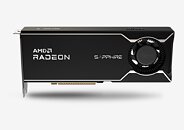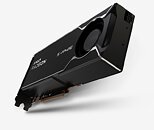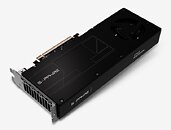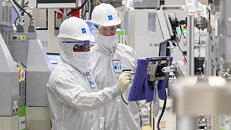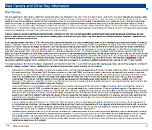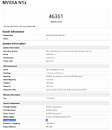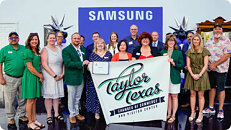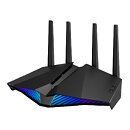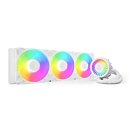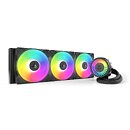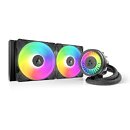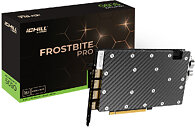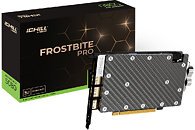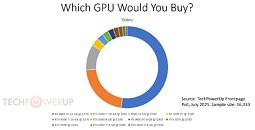News Search:

Thursday, July 31st 2025
Today's Reviews
Gaming PC
Headphones
Keyboards
Motherboards
Mouse
Processors

Montech X5 Review
Montech is expanding their X-series case lineup with the X5, which aims to provide a modern design while priced to appeal to the budget-minded crowd. The X5 is equipped with four ARGB fans, three of which are of the 140 mm variety, making it worthy of a closer look.

ASUS ROG Crosshair X870E Apex Review
The overclocking-focused Apex series comes to AMD Socket AM5, but does this $750 ROG motherboard have what it takes to be more than an expensive and niche weekend overclocking warrior?

EA Exec Shoots Down Battlefield 6 on Steam Deck—Other Handhelds Allowed
Following the recent Battlefield 6 multiplayer showcase that confirmed the existence of a UGC platform for the new shooter, EA's executive vice president, Vince Zampella, confirmed in an interview with PCGamesN that Battlefield 6 will not receive Steam Deck support. According to the executive, "It does not work on Steam Deck. I think there are some non-Steam-Deck handheld platforms that it will work on, probably, right? But I don't think, you know, it's probably not the best way to play the game."
This suggests that the reason for the lack of Steam Deck support comes down to incompatibility with SteamOS, rather than hardware limitations. The presumption is thus that Battlefield 6's EA anti-cheat still won't adopt Linux support. According to ProtonDB, 27% of Steam's current top 100 games work basically flawlessly with Valve's Proton compatibility layer, with an additional 52% receiving a "Gold" rating, which means the game runs basically perfectly using Proton with a little tweaking. Other gaming giants have also recently announced their intention to include Steam Deck and Linux compatibility in their upcoming titles, with Ubisoft being one notable example in recent months.
This suggests that the reason for the lack of Steam Deck support comes down to incompatibility with SteamOS, rather than hardware limitations. The presumption is thus that Battlefield 6's EA anti-cheat still won't adopt Linux support. According to ProtonDB, 27% of Steam's current top 100 games work basically flawlessly with Valve's Proton compatibility layer, with an additional 52% receiving a "Gold" rating, which means the game runs basically perfectly using Proton with a little tweaking. Other gaming giants have also recently announced their intention to include Steam Deck and Linux compatibility in their upcoming titles, with Ubisoft being one notable example in recent months.
Wooting Plans To Address 80HE Coating Issues in 60HE V2 Ahead of Launch
Since the launch of the Wooting 80HE, the keyboard brand has seemingly had nothing but trouble with its coatings on the zinc alloy cases for that keyboard, with users reporting chipping and peeling of the coating, sometimes after relatively short periods of use. As part of the development of the Wooting 60HE V2, Wooting has been investigating these coating issues in an attempt to avoid the same situation for the new compact keyboard. In a recent video published on YouTube, Wooting founder, Calder Limmen, revealed that the brand's testing has narrowed the cause of the coating degradation down to a reaction with sweat. Wooting says that the number of these cases is "almost negligible" compared to the overall sales figures of the 80HE.
In an attempt to address the issue for the upcoming 60HE V2, the company has been conducting tests on the new aluminium case slated to launch with the 60HE V2, using artificial sweat and controlled environments. The test revealed that certain chemicals and oils in sweat are reacting to the coating specifically, and not the alloy itself, although the company declined to mention which chemicals were specifically causing the issues. The good news for prospective buyers of the 60HE V2 is that Wooting says it is closing in on a coating process that will mitigate the peeling issues. Limmen also mentions that the coating issue is one of the reasons the price for the 60HE V2 has not been announced yet.
In an attempt to address the issue for the upcoming 60HE V2, the company has been conducting tests on the new aluminium case slated to launch with the 60HE V2, using artificial sweat and controlled environments. The test revealed that certain chemicals and oils in sweat are reacting to the coating specifically, and not the alloy itself, although the company declined to mention which chemicals were specifically causing the issues. The good news for prospective buyers of the 60HE V2 is that Wooting says it is closing in on a coating process that will mitigate the peeling issues. Limmen also mentions that the coating issue is one of the reasons the price for the 60HE V2 has not been announced yet.

Apple Reports Third Quarter Results for Its Fiscal 2025
Apple today announced financial results for its fiscal 2025 third quarter ended June 28, 2025. The Company posted quarterly revenue of $94.0 billion, up 10 percent year over year, and quarterly diluted earnings per share of $1.57, up 12 percent year over year.
"Today Apple is proud to report a June quarter revenue record with double-digit growth in iPhone, Mac and Services and growth around the world, in every geographic segment," said Tim Cook, Apple's CEO. "At WWDC25, we were excited to introduce a beautiful new software design that extends across all of our platforms, and we announced even more great Apple Intelligence features."
"Today Apple is proud to report a June quarter revenue record with double-digit growth in iPhone, Mac and Services and growth around the world, in every geographic segment," said Tim Cook, Apple's CEO. "At WWDC25, we were excited to introduce a beautiful new software design that extends across all of our platforms, and we announced even more great Apple Intelligence features."
Supervive Update Partly Addresses 1.0 Launch Complaints That Tanked Review Score
Supervise recently exited Early Access on Steam with its 1.0 launch that changed many of the MOBA's core mechanics and ended up angering much of its fan base. One of the main complaints about the launch update was that it changed the rewards structure in a way that encouraged heavy grinding and pay-to-win behavior. With the latest hotfix (full patch notes here) the game's developer, Theorycraft, has made changes to the reward structure to give casual players more of an incentive to play. The game now rewards players with more in-game currency for completing challenges and daily missions—from 100 Prisma to 400 Prisma per mission. The individual Prisma gains for killing enemies have also increased, as have rewards for defeating minions and bosses. The changes also include changes to the RNG that introduce a counter that guarantees a legendary relic or perk after a certain number of capsule rolls, and equipment drops are much more frequent throughout the game as a whole.
In a dev log following the patch, in hopes of addressing the flood of negative reviews by acknowledging player feedback and giving players an idea of where the game is going in the future. For starters, Theorycraft says it will be engaging much more closely with the wider Supervive audience going forward. The idea is to share planned updates and features on Steam ahead of roll-out in order to gather player feedback in the ensuing discussion. Additionally, the developer acknowledged that the new-player experience needs work, so it plans to adjust the progression system accordingly, building on the changes mentioned in the above patch notes so that equipment scales according to the overall lobby level. The idea is to allow new players in more experienced lobbies to catch up more quickly to the rest of the lobby by giving them equipment that somewhat levels the playing field. Balance was also an issue that was addressed, with Theorycraft confirming the development team is working on a patch to make some of the more "oppressive" characters feel less overwhelming. According to the post, there will be a larger patch in the first week of August with more changes and a new hunter.
In a dev log following the patch, in hopes of addressing the flood of negative reviews by acknowledging player feedback and giving players an idea of where the game is going in the future. For starters, Theorycraft says it will be engaging much more closely with the wider Supervive audience going forward. The idea is to share planned updates and features on Steam ahead of roll-out in order to gather player feedback in the ensuing discussion. Additionally, the developer acknowledged that the new-player experience needs work, so it plans to adjust the progression system accordingly, building on the changes mentioned in the above patch notes so that equipment scales according to the overall lobby level. The idea is to allow new players in more experienced lobbies to catch up more quickly to the rest of the lobby by giving them equipment that somewhat levels the playing field. Balance was also an issue that was addressed, with Theorycraft confirming the development team is working on a patch to make some of the more "oppressive" characters feel less overwhelming. According to the post, there will be a larger patch in the first week of August with more changes and a new hunter.

NVIDIA to End GeForce Regular Driver Support for Maxwell, Volta, and Pascal GPUs in Q4
NVIDIA is planning to retire regular driver updates for its older, pre-RTX GPU generations after October 2025, the company announced. These include the GeForce GTX 900 series based on the "Maxwell" graphics architecture, the sole gaming graphics card powered by "Volta," the GeForce TITAN V, and the GeForce GTX 10-series based on the "Pascal" graphics architecture. The company will continue regular Game Ready driver updates for GTX 16-series "Turing" besides all RTX 20-series, 30-series, 40-series, and 50-series GPUs.
With Microsoft stopping support for Windows 10, except for those on an extended support program, NVIDIA has decided to release drivers compatible with Windows 10 only till October 2026, following which the regular driver only cover Windows 11 and the future Windows 12 expected to release later this year. It is commendable that NVIDIA decided to support its pre-RTX architectures for this long, considering that the GTX 900-series debuted 11 years ago, the TITAN V 8 years ago, and the GTX 10-series 9 years ago.
Support Plan detailed in the 580.88 WHQL driver patch notes:
"After a final Game Ready Driver release in October 2025, GeForce GPUs based on Maxwell, Pascal, and Volta architectures will transition to receiving quarterly security updates for the next three years (through October 2028). Our support lifetime for these GPUs reaches up to 11 years, well beyond industry norms.
Also, we're extending Windows 10 Game Ready Driver support for all GeForce RTX GPUs to October 2026, a year beyond the operating system's end-of-life, to ensure users continue to receive the latest day-0 optimizations for new games and apps."
With Microsoft stopping support for Windows 10, except for those on an extended support program, NVIDIA has decided to release drivers compatible with Windows 10 only till October 2026, following which the regular driver only cover Windows 11 and the future Windows 12 expected to release later this year. It is commendable that NVIDIA decided to support its pre-RTX architectures for this long, considering that the GTX 900-series debuted 11 years ago, the TITAN V 8 years ago, and the GTX 10-series 9 years ago.
Support Plan detailed in the 580.88 WHQL driver patch notes:
"After a final Game Ready Driver release in October 2025, GeForce GPUs based on Maxwell, Pascal, and Volta architectures will transition to receiving quarterly security updates for the next three years (through October 2028). Our support lifetime for these GPUs reaches up to 11 years, well beyond industry norms.
Also, we're extending Windows 10 Game Ready Driver support for all GeForce RTX GPUs to October 2026, a year beyond the operating system's end-of-life, to ensure users continue to receive the latest day-0 optimizations for new games and apps."
Battlefield 6's Game-Changing Multiplayer and More Revealed During Blockbuster Global Event
Today, during a live global multiplayer reveal event, Electronic Arts and Battlefield Studios unveiled Battlefield 6, the ultimate all-out warfare experience. Launching on October 10, Battlefield 6 is available on PlayStation 5, Xbox Series X/S, and PC (Steam, EA App, Epic Games Store). During the blockbuster event, Battlefield Studios provided a first look at new and returning multiplayer modes, a tantalizing sneak peek of the global scale blockbuster Single Player campaign and of course the evolution of Battlefield Portal.
The year is 2027. The world is on the edge of chaos. After a high-profile assassination shocks the world, major European countries have left NATO, while the US and its allies grapple with the fallout. A massive private military corporation unafraid to cross lines, with deep pockets and the latest tech, looks to fill the power vacuum. This army is PAX ARMATA. What's left of NATO is in tatters, wounded and battered. This is the world of Battlefield 6.
The year is 2027. The world is on the edge of chaos. After a high-profile assassination shocks the world, major European countries have left NATO, while the US and its allies grapple with the fallout. A massive private military corporation unafraid to cross lines, with deep pockets and the latest tech, looks to fill the power vacuum. This army is PAX ARMATA. What's left of NATO is in tatters, wounded and battered. This is the world of Battlefield 6.

Mafia: The Old Country PC System Requirements and Features Detailed
2K Games and Hangar 13 have detailed the full PC features and graphics settings, as well as official system requirements for the upcoming Mafia: The Old Country game that will launch on August 8th. It is interesting to see that the game will support AMD's FSR 4, NVIDIA's DLSS 4, and Intel's XeSS 2 with Frame Generation FSR, DLSS, and XeSS on supported hardware, but there is no ray tracing. It will also support Unreal Temporal Super Resolution (TSR), have uncapped frame rate during gameplay, ultrawide monitor and HDR support.
The list includes minimum, recommended and epic preset requirements, and all are using Unreal TSR set to either Balanced or Quality mode. The minimum requirements target 1080p resolution with graphics settings set at Medium and Unreal TSR set at Balanced. You will need at least an AMD Ryzen 7 2700X or Intel Core i7-9700K CPU, 16 GB of RAM, and either an AMD Radeon RX 5700 XT or NVIDIA RTX 2070 graphics card. The recommended requirements target 1440p resolution with graphics quality preset set to High and Unreal TSR set to Quality. These settings require an AMD Ryzen 7 5800X or Intel Core i7-12700K CPU, 32 GB of RAM, and either an AMD Radeon RX 6950 XT or an NVIDIA RTX 3080 Ti graphics card.
The list includes minimum, recommended and epic preset requirements, and all are using Unreal TSR set to either Balanced or Quality mode. The minimum requirements target 1080p resolution with graphics settings set at Medium and Unreal TSR set at Balanced. You will need at least an AMD Ryzen 7 2700X or Intel Core i7-9700K CPU, 16 GB of RAM, and either an AMD Radeon RX 5700 XT or NVIDIA RTX 2070 graphics card. The recommended requirements target 1440p resolution with graphics quality preset set to High and Unreal TSR set to Quality. These settings require an AMD Ryzen 7 5800X or Intel Core i7-12700K CPU, 32 GB of RAM, and either an AMD Radeon RX 6950 XT or an NVIDIA RTX 3080 Ti graphics card.
Ayaneo Teases Pocket Vert: Portrait Handheld Game Console for Retro Emulation
Along with the recent launch of the AMD Strix Halo-powered Ayaneo Next 2, Ayaneo also announced the Ayaneo Pocket Vert in its latest 2025-2026 Strategy Sharing Session video on YouTube. The Vert is an Android-powered gaming handheld that is apparently intended for mobile emulation of retro games. It should also be capable of playing current mobile games intended for portrait-orientation gaming, although it's unclear how much tinkering will be required to get those games to install and work properly.
Exact specifications have yet to be revealed, but Ayaneo says that it will feature an "ultra-HD" display, suggesting that it might have a 4K resolution. The exact display size and aspect ratio are also unknown, although something like 1:1 or 2:3 seem likely, given the handheld's "retro" intentions. During the presentation, Ayaneo teased the form factor of the Vert in the bottom portion of an image—the third image embedded below. What appears to be a Vert laying on its side looks to be split in half, with the top (or left in the image) half being dedicated to display duties, while the bottom (right) will be a thicker control portion with an angular design. Materials are, again, unclear, but Ayaneo says that it will use "premium" materials, suggesting that there may be an aluminium frame. It doesn't look like the new device will feature any of the flip-out or slide-out functions of the Ayaneo Pocket DS or Ayaneo Slide.
Exact specifications have yet to be revealed, but Ayaneo says that it will feature an "ultra-HD" display, suggesting that it might have a 4K resolution. The exact display size and aspect ratio are also unknown, although something like 1:1 or 2:3 seem likely, given the handheld's "retro" intentions. During the presentation, Ayaneo teased the form factor of the Vert in the bottom portion of an image—the third image embedded below. What appears to be a Vert laying on its side looks to be split in half, with the top (or left in the image) half being dedicated to display duties, while the bottom (right) will be a thicker control portion with an angular design. Materials are, again, unclear, but Ayaneo says that it will use "premium" materials, suggesting that there may be an aluminium frame. It doesn't look like the new device will feature any of the flip-out or slide-out functions of the Ayaneo Pocket DS or Ayaneo Slide.

Intel Adds Three Entry-Level Arrow Lake Processors to Ultra 5 Series 2
Intel has quietly rolled out three new Arrow Lake processors as part of its Ultra 5 lineup, enhancing its entry-level options with the Ultra 5 235A, 235TA, and 235UA models. The Ultra 5 235A and 235TA processors are quite similar, both featuring a total of 14 cores—six of which are performance cores and eight are efficient cores with 14 threads. They can both reach turbo frequencies of 5 GHz on their performance cores, while the efficient cores can go up to 4.4 GHz. The main difference between the two CPUs is the power consumption and base frequencies. The Ultra 5 235A runs at 65 W with its performance cores clocking at a base frequency of 3.4 GHz. The Intel Ultra 5 235TA is designed to be more power-efficient, operating at just 35 W with its performance cores running at a base frequency of 2.2 GHz. Both of these desktop models are built using TSMC's N3B manufacturing process and come equipped with 24 MB of Smart Cache.
Update 19:03 UTC:
The Ultra 5 235UA has an identical device ID to the Ultra 7 265U, a Meteor Lake based CPU that uses Redwood Cove P-Cores and Crestmont E-Cores, thus, the CPU does actually have 12 cores and 14 threads, due to the two P-Cores offering Hyper-Threading, which was removed in Arrow Lake's Lion Cove P-Core design, for security, area efficiency, and performance reasons. This is quite confusing, since the product is marketed as an Arrow Lake "Series 2" CPU, but is actually based on the preceding mobile only Meteor Lake "Series 1" architecture. The only differences between the 235UA/265U and the Meteor Lake 165U is the process node the chip is built on, with the 165U being fabbed on Intel 4, and the 265U/235UA refresh chips being fabbed on Intel 3, which allows for a slight clock speed bump within the same power budget.
Update 19:03 UTC:
The Ultra 5 235UA has an identical device ID to the Ultra 7 265U, a Meteor Lake based CPU that uses Redwood Cove P-Cores and Crestmont E-Cores, thus, the CPU does actually have 12 cores and 14 threads, due to the two P-Cores offering Hyper-Threading, which was removed in Arrow Lake's Lion Cove P-Core design, for security, area efficiency, and performance reasons. This is quite confusing, since the product is marketed as an Arrow Lake "Series 2" CPU, but is actually based on the preceding mobile only Meteor Lake "Series 1" architecture. The only differences between the 235UA/265U and the Meteor Lake 165U is the process node the chip is built on, with the 165U being fabbed on Intel 4, and the 265U/235UA refresh chips being fabbed on Intel 3, which allows for a slight clock speed bump within the same power budget.
Areca Intros M.2 Gen 5 SSD HBA Powering 8 Drives Over x16 with a Bridge Chip
Areca introduced the ARC-1689-8N, a unique M.2 NVMe RAID HBA that lets you pack up to eight M.2-2280 SSDs each with a PCI-Express 5.0 x4 interface, over the card's PCI-Express 5.0 x16 interface. Normally a card like this should only feature four M.2 slots, by segmenting the x16 interface to four x4 interfaces, but this card uses an active bridge chip, the Broadcom PEX89048. This chip is designed by the erstwhile PLX Technologies team. It has a 48-lane PCI-Express Gen 5 switching fabric that takes in 16 Gen 5 lanes, and puts out 32 Gen 5 lanes, making it possible for the ARC-1689-8N to have eight M.2 slots, each with full Gen 5 x4 wiring.
M.2 Gen 5 SSDs run hot, especially the ones with 12-14 GB/s sequential transfer rates and DRAM caches; and so the card uses an active fan-heatsink cooling solution consisting of an extruded aluminium heatsink with thermal pads over each M.2-2280 slot, and a pair of 40 mm fans ventilating the heatsink laterally. The card has a 6-pin PCIe power input, which when combined with the slot power, results in a 150 W power budget. A number of NVMe RAID options can be deployed, including 0, 1, 10, JBOD, or non-RAID; with the company claiming a peak sequential transfer rate for a RAID 0 volume of 60 GB/s. The card is 26.2 cm long, and is strictly 1 slot thick.
M.2 Gen 5 SSDs run hot, especially the ones with 12-14 GB/s sequential transfer rates and DRAM caches; and so the card uses an active fan-heatsink cooling solution consisting of an extruded aluminium heatsink with thermal pads over each M.2-2280 slot, and a pair of 40 mm fans ventilating the heatsink laterally. The card has a 6-pin PCIe power input, which when combined with the slot power, results in a 150 W power budget. A number of NVMe RAID options can be deployed, including 0, 1, 10, JBOD, or non-RAID; with the company claiming a peak sequential transfer rate for a RAID 0 volume of 60 GB/s. The card is 26.2 cm long, and is strictly 1 slot thick.
Ravine Games to Demo Ghibli-Inspired Kingdom in City Builder RAEV at Gamescom 2025
Unlock the keys to your kingdom for the first time at Gamescom 2025! RAEV: Kingdom on the Distant Shores will debut its first playable demo at the Ravine Games booth, located at hall 10-1, booth B060 from August 20th - 24th!
Developed by Ravine Games and published by V Publishing, RAEV provides players with a strategic adventure spanning an entire continent. RAEV is an innovative city builder that combines large-scale world building, strategic resource management, and dynamic storytelling that is largely impacted by your decisions.
Developed by Ravine Games and published by V Publishing, RAEV provides players with a strategic adventure spanning an entire continent. RAEV is an innovative city builder that combines large-scale world building, strategic resource management, and dynamic storytelling that is largely impacted by your decisions.
MicroProse to Publish Satirical Tycoon Game "Car Park Capital" by Hilkojj Interactive
MicroProse, the veteran publisher behind genre-defining strategy and simulation games, is proud to announce a partnership with Hilkojj Interactive to publish Car Park Capital: a gleefully satirical tycoon sim about paving the way for a brighter, oilier future.
In Car Park Capital, players are hired by Big Auto to reshape quiet towns into sprawling concrete kingdoms - one parking lot at a time. Using a potent mix of real-time strategy, urban development tools, and tongue-in-cheek propaganda, players will bulldoze houses, raise towering asphalt cathedrals, and convince citizens that life is better with more cars (and fewer opinions). The game blends classic tycoon gameplay with razor-sharp social commentary about car dependency, urban sprawl, and the subtle art of turning convenience into ideology, all in glorious simulation.
In Car Park Capital, players are hired by Big Auto to reshape quiet towns into sprawling concrete kingdoms - one parking lot at a time. Using a potent mix of real-time strategy, urban development tools, and tongue-in-cheek propaganda, players will bulldoze houses, raise towering asphalt cathedrals, and convince citizens that life is better with more cars (and fewer opinions). The game blends classic tycoon gameplay with razor-sharp social commentary about car dependency, urban sprawl, and the subtle art of turning convenience into ideology, all in glorious simulation.
Retro Games Limited and Plaion Replai Announce 'TheC64 Mini - Black Edition'
PLAION REPLAI, a leading global publisher and developer of retro video game software and hardware, and Retro Games Ltd. (RGL), creators of the acclaimed THEC64 range, are proud to announce THEC64 mini - Black Edition, launching globally on 24th October 2025. This stunning new Black Edition of the best-selling THEC64 Mini has been beautifully reimagined in a bold matte-and-gloss black finish, making it a striking, collectible redesign of the beloved 8-bit machine. Along with the sleek aesthetic, THEC64 mini - Black Edition arrives with 25 hand-picked pre-installed Neo-Classic retro games, all among the highest rated C64 titles and many of which have been enhanced for this release and are otherwise commercially unavailable.
THEC64 mini - Black Edition is a modern reimagining of the Commodore 64, one of the most iconic home computers of all time. With more than 17 million units sold globally, the original C64 shaped generations of coders, gamers, musicians, and digital artists.
THEC64 mini - Black Edition is a modern reimagining of the Commodore 64, one of the most iconic home computers of all time. With more than 17 million units sold globally, the original C64 shaped generations of coders, gamers, musicians, and digital artists.

NVIDIA Releases GeForce 580.88 WHQL Game Ready Drivers
NVIDIA has released the newest version of its GeForce graphics driver, the GeForce 580.88 WHQL, which comes with Game Ready optimizations for Mafia: The Old Country, which includes DLSS 4 with Multi Frame Generation, DLSS Frame Generation, DLSS Super Resolution, and NVIDIA Reflex support. The new driver also adds DLSS 4 with Multi Frame Generation support for Clair Obscur: Expedition 33 and Microsoft Flight Simulator 2024. NVIDIA also added support for 62 new G-SYNC Compatible gaming displays. The new driver also fixes some gaming and general bugs.
According to the release notes, the NVIDIA GeForce 580.88 WHQL driver fixes issues in Marvel's Spider-Man Remastered, World of Warcraft, Starcraft Remastered and several other games, including issues with Battlefield 2042, which experienced random squares and flickering artifacts and micro-stutter issues when VSYNC is enabled in Cyberpunk 2077. It also fixes issues in Blender and Cloudflare WARP, issues with GPU video memory after enabling NVIDIA Smooth Motion, and an issue where the GPU scaling option is missing from NVIDIA Control Panel/NVIDIA App when a DSC monitor is connected. The driver also fixes flickering issues during window resize with the Samsung 57-inch Odyssey Neo G9 and blank screen issues in DisplayPort 2.1 mode with HDR on the LGE 27GX790A-B. NVIDIA also announced it will continue supporting Maxwell, Pascal, and Volta GPUs with Game Ready drivers until October 2025, after which these will get quarterly security updates for the next three years. NVIDIA is also extending Windows 10 Game Ready Driver support for all GeForce RTX GPUs to October 2026
DOWNLOAD: NVIDIA GeForce 580.88 WHQL
According to the release notes, the NVIDIA GeForce 580.88 WHQL driver fixes issues in Marvel's Spider-Man Remastered, World of Warcraft, Starcraft Remastered and several other games, including issues with Battlefield 2042, which experienced random squares and flickering artifacts and micro-stutter issues when VSYNC is enabled in Cyberpunk 2077. It also fixes issues in Blender and Cloudflare WARP, issues with GPU video memory after enabling NVIDIA Smooth Motion, and an issue where the GPU scaling option is missing from NVIDIA Control Panel/NVIDIA App when a DSC monitor is connected. The driver also fixes flickering issues during window resize with the Samsung 57-inch Odyssey Neo G9 and blank screen issues in DisplayPort 2.1 mode with HDR on the LGE 27GX790A-B. NVIDIA also announced it will continue supporting Maxwell, Pascal, and Volta GPUs with Game Ready drivers until October 2025, after which these will get quarterly security updates for the next three years. NVIDIA is also extending Windows 10 Game Ready Driver support for all GeForce RTX GPUs to October 2026
DOWNLOAD: NVIDIA GeForce 580.88 WHQL

Dozen New Games Coming to NVIDIA GeForce NOW in August
August brings new levels of gaming excitement on GeForce NOW, with 2,300 titles now available to stream in the cloud. Grab a controller and get ready for epic adventures - a dozen new games are coming to the cloud this month. Each week brings fresh titles for members to discover, stream and conquer. Get ready to shrink down for big fun - early access for Grounded 2, announced as a surprise in June at XBOX Games Showcase, will be available to stream on day one: tomorrow, Aug. 1. Plus, finish off July with the eight games available to stream this week, alongside the latest update for the acclaimed open-world action role-playing game Genshin Impact.
The Park Is Calling
Step into the wild, unpredictable world of Brookhollow Park - Grounded 2 is launching in early access in the cloud, and the backyard has never felt bigger or more alive. Shrink to the size of an ant, navigate towering blades of grass, uncover hidden secrets and face off against bugs that can be friend or foe. Craft weapons and armor from scavenged materials, build creative bases and raise Buggie companions to help explore and survive. Whether playing solo or with friends, every day brings new challenges and surprises. Grounded 2's quirky humor and inventive gameplay make every moment an adventure, from dodging predators to racing Buggies through underground tunnels.
The Park Is Calling
Step into the wild, unpredictable world of Brookhollow Park - Grounded 2 is launching in early access in the cloud, and the backyard has never felt bigger or more alive. Shrink to the size of an ant, navigate towering blades of grass, uncover hidden secrets and face off against bugs that can be friend or foe. Craft weapons and armor from scavenged materials, build creative bases and raise Buggie companions to help explore and survive. Whether playing solo or with friends, every day brings new challenges and surprises. Grounded 2's quirky humor and inventive gameplay make every moment an adventure, from dodging predators to racing Buggies through underground tunnels.
Keysight Installs World's Largest Commercial Quantum Control System in Japan
Keysight Technologies, Inc. has delivered the world's largest commercial quantum control system (QCS) to the National Institute of Advanced Industrial Science and Technology (AIST) in Japan. The system has been integrated into the Global Research and Development Center for Business by Quantum-AI Technology (G-QuAT). This control system is now part of the new evaluation testbed at G-QuAT, which will push the limits of what is possible with quantum computing in terms of both scale and performance.
All quantum computers require a control system to translate from the classical world of code and cables to the quantum world of photons and qubits. As quantum computers grow in size, complexity, and performance, requirements for the control system become much more stringent. Any gap in the control system performance can compromise the capabilities of the quantum computer, so it was important for AIST to select the right partner for this critical component.
All quantum computers require a control system to translate from the classical world of code and cables to the quantum world of photons and qubits. As quantum computers grow in size, complexity, and performance, requirements for the control system become much more stringent. Any gap in the control system performance can compromise the capabilities of the quantum computer, so it was important for AIST to select the right partner for this critical component.

AMD Chips Made at TSMC USA to Cost 5-20 Percent More, But Worth it: CEO Lisa Su
In an interview with Bloomberg, AMD CEO Dr Lisa Su revealed that the company's chips manufactured at the U.S. based fab of TSMC will cost anywhere between 5% to 20% more than the ones TSMC makes back home in Taiwan, but assured that the added cost and supply-chain resilience would make the price-hike worth the effort. Su alluded to the lack of supply-chain resilience being sorely felt by the tech industry during the COVID-19 pandemic years, causing significant second order effects across the world economy.
TSMC has a manufacturing facility in Arizona, but its most advanced node is 4 nm EUV, referred to internally as the N4 family of foundry nodes by TSMC. AMD makes various CPUs, GPUs, FPGAs, and other devices on the TSMC N4P node, but the company is transitioning to the new TSMC N2 (2 nm Nanosheet) node, starting with its next-generation "Zen 6" CPU family. It is widely expected that while the CCDs of "Zen 6" based Ryzen desktop and EPYC server processors are based on N2, the company will introduce new-generation I/O dies for both its client and server processors that will be built on TSMC N4P, advancing from the current TSMC N6.
TSMC has a manufacturing facility in Arizona, but its most advanced node is 4 nm EUV, referred to internally as the N4 family of foundry nodes by TSMC. AMD makes various CPUs, GPUs, FPGAs, and other devices on the TSMC N4P node, but the company is transitioning to the new TSMC N2 (2 nm Nanosheet) node, starting with its next-generation "Zen 6" CPU family. It is widely expected that while the CCDs of "Zen 6" based Ryzen desktop and EPYC server processors are based on N2, the company will introduce new-generation I/O dies for both its client and server processors that will be built on TSMC N4P, advancing from the current TSMC N6.
KONKR Pocket FIT Android Handheld Officially Unveiled
On the evening of July 30, 2025, AYANEO hosted a live online event to unveil the first product under its brand-new sub-brand KONKR—the KONKR Pocket FIT. This strategic new Android handheld has been in development for over a year and now makes its official debut to global players, not only marking the official launch of KONKR but also showcasing AYANEO's relentless innovation and exploration in the handheld gaming space. With its exceptional price-to-performance ratio, the KONKR Pocket FIT is boldly positioned as the Android handheld king—built for every gamer.
Extreme Value, Born for Every Gamer
The creation of KONKR is AYANEO's answer to a growing demand for both high performance and high value. With flagship hardware and a premium user experience, KONKR redefines what players can expect from a cost-effective handheld. The KONKR Pocket FIT is the first creation of this new vision—a true handheld marvel.
Extreme Value, Born for Every Gamer
The creation of KONKR is AYANEO's answer to a growing demand for both high performance and high value. With flagship hardware and a premium user experience, KONKR redefines what players can expect from a cost-effective handheld. The KONKR Pocket FIT is the first creation of this new vision—a true handheld marvel.
IBASE Announces CP100 Ultra-Compact Rugged Embedded Edge Computer
IBASE Technology Inc., a leading provider of industrial computing solutions, debuts the CP100 ultra-compact rugged embedded edge computer, purpose-built for high-reliability and long-term operation in space-limited environments. Powered by the AMD Ryzen Embedded R2000 Series processor, the CP100 offers three chipset configurations, allowing users to tailor computing performance to specific application needs.
Engineered for minimal footprint, the CP100 adopts a 2.5-inch SBC design with a compact system size of just 94 (W) x 133 (D) x 51 (H) mm, making it ideal for industrial and embedded edge applications requiring efficient, multithreaded performance in tight spaces. It also supports DIN-rail mounting, enabling easy deployment in various automation systems and equipment architectures.
Engineered for minimal footprint, the CP100 adopts a 2.5-inch SBC design with a compact system size of just 94 (W) x 133 (D) x 51 (H) mm, making it ideal for industrial and embedded edge applications requiring efficient, multithreaded performance in tight spaces. It also supports DIN-rail mounting, enabling easy deployment in various automation systems and equipment architectures.

BIOSTAR Partners with ARES to Build Edge Computing and IPC Ecosystem in Korea
BIOSTAR, a leading manufacturer of edge computing solutions, motherboards, graphics cards, and storage devices, is excited to announce a strategic partnership with ARES, a prominent IPC solution provider in South Korea. This collaboration marks a significant step toward expanding BIOSTAR's industrial computing presence in the Korean market. Through this partnership, ARES will distribute BIOSTAR's powerful EdgeComp product lineup and integrate these solutions into their ecosystem-focused offerings for industrial and edge computing applications. As part of this initiative, BIOSTAR's full range of EdgeComp systems is now available on the ARES official website.
The BIOSTAR EdgeComp lineup now available through ARES includes a wide range of powerful and efficient systems tailored for industrial deployment. Models such as the EdgeComp MS-1315UE, MS-1335U, MS-J6412, MS-N97, MS-X6413E, MS-X7433RE, and MT PRO-J6412 are designed to meet the performance demands of various edge applications. These systems are ideal for intelligent factory automation, AIoT integration, digital signage, industrial control systems, and real-time data processing at the edge. With fanless designs, wide temperature support, and flexible I/O configurations, the EdgeComp series offers scalable and rugged solutions for Korea's evolving industrial landscape.
The BIOSTAR EdgeComp lineup now available through ARES includes a wide range of powerful and efficient systems tailored for industrial deployment. Models such as the EdgeComp MS-1315UE, MS-1335U, MS-J6412, MS-N97, MS-X6413E, MS-X7433RE, and MT PRO-J6412 are designed to meet the performance demands of various edge applications. These systems are ideal for intelligent factory automation, AIoT integration, digital signage, industrial control systems, and real-time data processing at the edge. With fanless designs, wide temperature support, and flexible I/O configurations, the EdgeComp series offers scalable and rugged solutions for Korea's evolving industrial landscape.

Alphacool Unveils Apex Distro Plates for the Fractal North XL PC Case
The Alphacool International GmbH, based in Braunschweig, Germany, is a pioneer in PC water cooling technology. With the most comprehensive product portfolios in the industry and over 20 years of experience, Alphacool is now expanding its lineup with the Apex Distro Plates for the Fractal North XL case.
The Apex product line stands for premium quality, featuring high-end materials and innovative technology. To prevent potential leaks caused by cracks, the chrome-plated G1/4" brass fittings are equipped with O-rings and securely embedded into the acrylic. Crafted from high-quality acrylic glass and enhanced with aRGB lighting, the Apex Distro Plate not only offers a clear view of the water cooling loop but also impresses with stunning lighting effects. It is compatible with pumps in the D5/VPP or DDC format and, thanks to the included 90° mounting system, allows for a flexible and space-efficient installation inside the North XL case. Available in black and white, the distro plate seamlessly complements the design case's design.
The Apex product line stands for premium quality, featuring high-end materials and innovative technology. To prevent potential leaks caused by cracks, the chrome-plated G1/4" brass fittings are equipped with O-rings and securely embedded into the acrylic. Crafted from high-quality acrylic glass and enhanced with aRGB lighting, the Apex Distro Plate not only offers a clear view of the water cooling loop but also impresses with stunning lighting effects. It is compatible with pumps in the D5/VPP or DDC format and, thanks to the included 90° mounting system, allows for a flexible and space-efficient installation inside the North XL case. Available in black and white, the distro plate seamlessly complements the design case's design.
This Netflix Alternative Has No Fees
If your Netflix "Recommended for You" section actually reflected your taste, you wouldn't be scrolling past 14 dating shows and a baking competition every time you open your streaming app. What's the point of an algorithm if it doesn't get you? If you're craving substance over filler, MagellanTV might be the streaming platform you've been waiting for.
This documentary-only streaming service skips the fluff and dives deep into science, history, culture, space, and true crime. There are no ads, no recurring fees, and no gimmicks. For a one-time payment of $149.97 (reg. $999), you get lifetime access to over 4,000 titles, weekly content updates, and curated playlists actually to help you discover something new. It's smart, thoughtful streaming that works on the devices you already have.
Get a MagellanTV lifetime subscription for $149.97 (MSRP $999)
This documentary-only streaming service skips the fluff and dives deep into science, history, culture, space, and true crime. There are no ads, no recurring fees, and no gimmicks. For a one-time payment of $149.97 (reg. $999), you get lifetime access to over 4,000 titles, weekly content updates, and curated playlists actually to help you discover something new. It's smart, thoughtful streaming that works on the devices you already have.
Get a MagellanTV lifetime subscription for $149.97 (MSRP $999)
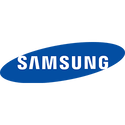
Samsung Electronics Announces Second Quarter 2025 Results
Samsung Electronics today reported financial results for the second quarter ended June 30, 2025. The Company posted KRW 74.6 trillion in consolidated revenue, a decrease of 5.8% compared to the previous quarter. Operating profit decreased to KRW 4.7 trillion.
The Device Solutions (DS) Division reported an increase in revenue on the back of expanded sales of high density, high-performance memory products, but inventory value adjustments in memory and one-off costs related to the impacts of export restrictions related to China in non-memory had an adverse effect on profit. In the Device eXperience (DX) Division, operating profit declined quarter-on-quarter due to a sequential decline in sales volume following the launch of new smartphone models in the first quarter. Looking ahead to H2, the DS Division plans to proactively meet the growing demand for high-value-added and AI-driven products and continue to strengthen competitiveness in advanced semiconductors. The DX Division will seek to minimize the impact of uncertainties stemming from tariff policies that are likely to persist.
The Device Solutions (DS) Division reported an increase in revenue on the back of expanded sales of high density, high-performance memory products, but inventory value adjustments in memory and one-off costs related to the impacts of export restrictions related to China in non-memory had an adverse effect on profit. In the Device eXperience (DX) Division, operating profit declined quarter-on-quarter due to a sequential decline in sales volume following the launch of new smartphone models in the first quarter. Looking ahead to H2, the DS Division plans to proactively meet the growing demand for high-value-added and AI-driven products and continue to strengthen competitiveness in advanced semiconductors. The DX Division will seek to minimize the impact of uncertainties stemming from tariff policies that are likely to persist.

Nscale, Aker and OpenAI to establish Stargate Norway: a 100,000 NVIDIA GPU AI Gigafactory
Nscale Global Holdings Ltd. ("Nscale"), Aker ASA ("Aker") and OpenAI today announced the launch of Stargate Norway: an advanced AI infrastructure project in Narvik, Northern Norway. Powered entirely by renewable energy, the facility will target to deliver 100,000 NVIDIA GPUs by the end of 2026, with ambitions to scale significantly in the years ahead. Stargate Norway will be designed to provide secure, scalable, and energy-efficient infrastructure for sovereign AI workloads across Europe, fully aligned with European regulatory frameworks. The initiative is led by global AI infrastructure provider Nscale, in partnership with Aker and OpenAI.
Stargate Norway is planned to deliver 230MW of capacity, with ambitions to expand by an additional 290MW - positioning it among the most significant AI infrastructure investments in Europe. The project marks OpenAI's first data centre initiative on the continent and the inaugural European site under its 'OpenAI for Countries' program.
Stargate Norway is planned to deliver 230MW of capacity, with ambitions to expand by an additional 290MW - positioning it among the most significant AI infrastructure investments in Europe. The project marks OpenAI's first data centre initiative on the continent and the inaugural European site under its 'OpenAI for Countries' program.
Wednesday, July 30th 2025
Today's Reviews
Accessories
Cases
CPU Coolers
Keyboards
Monitors
Networking
Speakers

Orbital Pathfinder Review
What sets the Orbital Pathfinder apart from other mice is the fact that it is fully modular. Be it right-handed ergonomic or ambidextrous, the Pathfinder allows for thousands of configurations. Internally, PixArt's PAW3950 sensor is combined with Omron optical switches, and polling rates of up to 8000 Hz are supported in wireless operation.

Battlefield 6 Leaks Tip Launch Price as Rumored Beta Test Dates Surface
EA recently confirmed that it has no intention of increasing prices for its AAA gaming experiences, and that claim has just been backed up by leaks that Battlefield 6 will launch with a starting price of $69.99. According to prolific leaker, @billbil_kun on X, the new shooter will be available in both digital and physical versions for PC, PlayStation 5, and Xbox Series, with identical pricing across all three platforms. Battlefield 6 digital edition will cost $69.99, while the newly added physical edition will cost $99.99.
Additional reports out of Insider Gaming also point to upcoming closed and open beta tests for Battlefield 6 in August. The first, the closed beta test, will run from August 7-8, while the open beta will take place on August 9-10. There will also supposedly be a second open beta from August 14-17. The reports indicate that access to the beta tests will be limited to those who pre-order the game. EA and DICE have scheduled a "Battlefield 6 Official Multiplayer Gameplay Reveal Event" livestream on YouTube for July 31 at 11:30 AM PT (8:30 PM CEST), and it seems likely that the beta dates will be announced during this livestream. Battlefield 6 is slated to launch on October 10, 2025.
Additional reports out of Insider Gaming also point to upcoming closed and open beta tests for Battlefield 6 in August. The first, the closed beta test, will run from August 7-8, while the open beta will take place on August 9-10. There will also supposedly be a second open beta from August 14-17. The reports indicate that access to the beta tests will be limited to those who pre-order the game. EA and DICE have scheduled a "Battlefield 6 Official Multiplayer Gameplay Reveal Event" livestream on YouTube for July 31 at 11:30 AM PT (8:30 PM CEST), and it seems likely that the beta dates will be announced during this livestream. Battlefield 6 is slated to launch on October 10, 2025.

KIOXIA Launches UFS Ver. 4.1 Embedded Flash Memory Devices for Automotive Applications
KIOXIA America, Inc. today announced that it has begun sampling new Universal Flash Storage (UFS) Ver. 4.1 embedded memory devices designed for automotive applications. Engineered to meet the rigorous demands of next-generation in-vehicle systems, these new devices deliver significant performance, flexibility, and diagnostic enhancements - powered by KIOXIA's 8th generation BiCS FLASH 3D flash memory technology and in-house designed controller technology.
Available in capacities of 128 gigabytes (GB), 256 GB, 512 GB and 1 terabyte (TB), the new UFS 4.1 devices are designed to fit the needs of infotainment, ADAS, telematics, domain controllers, and vehicle computers. They meet AEC-Q100/1044 Grade 2 standards, supporting case temperature up to 115°C.
Available in capacities of 128 gigabytes (GB), 256 GB, 512 GB and 1 terabyte (TB), the new UFS 4.1 devices are designed to fit the needs of infotainment, ADAS, telematics, domain controllers, and vehicle computers. They meet AEC-Q100/1044 Grade 2 standards, supporting case temperature up to 115°C.

Rockstar Job Listings Point to GTA VI User-Generated Content Platform
Rockstar Games has put up two job listings for its Creator Platform, which is its team that is dedicated to enabling community- and user-generated content in its video games—features that have made games like Roblox, VRChat, and Second Life so popular. The job openings are for a senior product manager and an associate compliance manager, suggesting Rockstar is looking to bring the army of GTA modders into the fold in a more official capacity—there is even a mention of monetization in the job listings, which suggests some form of a paid mod or game mode platform that pays creators for their contributions. Including UGC in GTA 6 will also likely mean that Rockstar will be able to exercise greater levels of control over what can and cannot be included in things like mods.
This is not the first time we've heard of the potential for user-generated content in GTA 6, with previous leaks revealing that Rockstar had been quietly contacting popular Fortnite and Roblox UGC creators, although these job listings are more concrete evidence that the upcoming open-world action game may contain UGC. If the ambitions pan out, GTA 6 might include a Creator Platform with community-generated content, including custom game modes and mods. The job listing specifically mentions dedicated servers, so it stands to reason these features will be open to both multiplayer and single-player gameplay modes.
This is not the first time we've heard of the potential for user-generated content in GTA 6, with previous leaks revealing that Rockstar had been quietly contacting popular Fortnite and Roblox UGC creators, although these job listings are more concrete evidence that the upcoming open-world action game may contain UGC. If the ambitions pan out, GTA 6 might include a Creator Platform with community-generated content, including custom game modes and mods. The job listing specifically mentions dedicated servers, so it stands to reason these features will be open to both multiplayer and single-player gameplay modes.
Redragon Launches Antonius K745 Pro Full-Size Mechanical Keyboard With Enthusiast Touches and Custom Switches
Redragon has announced its latest full-size mechanical gaming keyboard in the Antonius K745 Pro, which features a surprisingly enthusiast-friendly design, wireless connectivity, and custom switches designed by Redragon to give the keyboard a "creamy" sound profile. The K745 Pro follows a traditional full-size layout, with 104 keys, and offers a row of four customizable shortcut keys above the num pad. This is largely the same layout featured in keyboards like the Keychron Q6 Max, and there are other similarities as well, like the retro-style double-shot PBT keycaps and the rear-mounted hardware switches for macOS/Windows mode selection and connectivity mode selection. The K745 Pro offers tri-mode connectivity, with 2.4 GHz, Bluetooth 3.0/5.0, and USB Type-C wired, and the wireless connectivity is backed up by a 4,000 mAh battery, although Redragon makes no battery life claims.
The Antonius K745 is decidedly a budget mechanical keyboard, especially by enthusiast standards, with an MSRP of just $64.99 and an early bird price of $51.99. Given the relatively low price, the K745 features a plastic case to keep costs down, but Redragon has still opted to include five layers of sound damping material (PO foam, IXPE switch foam, PET sound pad, bottom socket foam, and a silicone bottom pad). Interestingly, the switch plate is made of polycarbonate, which is again generally reserved for higher-end mechanical keyboards, and the case features a gasket mount design with TPR gaskets to isolate noise and cushion the typing feel somewhat. The Mint Mambo switches used in the K745 are lightweight, factory-lubed linear switches with 40 gf actuation force.
The Antonius K745 is decidedly a budget mechanical keyboard, especially by enthusiast standards, with an MSRP of just $64.99 and an early bird price of $51.99. Given the relatively low price, the K745 features a plastic case to keep costs down, but Redragon has still opted to include five layers of sound damping material (PO foam, IXPE switch foam, PET sound pad, bottom socket foam, and a silicone bottom pad). Interestingly, the switch plate is made of polycarbonate, which is again generally reserved for higher-end mechanical keyboards, and the case features a gasket mount design with TPR gaskets to isolate noise and cushion the typing feel somewhat. The Mint Mambo switches used in the K745 are lightweight, factory-lubed linear switches with 40 gf actuation force.

EA Sits Out $80 AAA Game Price Race for Now
Electronic Arts recently posted its financial results for Q1 of the 2026 financial year, boasting a reasonably positive outlook for the rest of the year to come, but perhaps more interesting is what came in a Q&A session after the earnings call. According to an Investing.com, transcript of the Q&A session, EA is "not looking to make any changes on pricing at this stage," with the EA CEO saying that the studio's pricing structure allows it to offer something at varying different price tags. The CEO's statement notably leaves room for an $80 offering to be tacked onto the top of its current offerings, although it implies that a price increase might include additional value in some form or another.
Battlefield 6 is expected to be EA's next big launch, and there were fears among gamers that EA would join Nintendo in its push for $80 AAA games, but it seems as though the gaming giant is—at least for now—hesitant to raise prices to that level. Microsoft previously announced that it would also be sticking to the current $69.99 ceiling when it dropped the price of The Outer Worlds 2 from $79.99 back down to $69.99 over "market conditions," going as far as to issue $10 refunds to pre-order customers.
Battlefield 6 is expected to be EA's next big launch, and there were fears among gamers that EA would join Nintendo in its push for $80 AAA games, but it seems as though the gaming giant is—at least for now—hesitant to raise prices to that level. Microsoft previously announced that it would also be sticking to the current $69.99 ceiling when it dropped the price of The Outer Worlds 2 from $79.99 back down to $69.99 over "market conditions," going as far as to issue $10 refunds to pre-order customers.

AMD Now "World's Fastest" in Nearly all Processor Form-factors
AMD announced that it is now world's fastest in nearly all CPU form-factors. The company took Gold and Silver places in the latest Top500 supercomputers list, driven by a combination of 4th Gen EPYC "Genoa" CPUs and Instinct MI300A AI GPUs. It also has the world's most powerful AI PC processor with the Ryzen AI Max "Strix Halo" processor. With AMD enabling OEMs to combine the chip with up to 96 GB of unified 256-bit LPDDR5X memory, "Strix Halo" is the only PC processor capable of accelerating 128B-parameter AI models locally.
AMD has the world's fastest desktop processor for both gaming and productivity in the Ryzen 9 9950X3D "Granite Ridge-X", which is significantly faster than the Intel Core Ultra 9 285K in both gaming and productivity. It also has the world's fastest processor for laptops with the Ryzen 9 9955HX3D "Fire Range-X," which is essentially a mobile-friendly BGA package of the 9950X3D. With their high core counts, higher memory channel and PCIe lane counts, 5th Gen EPYC "Turin" processors dominate the server space in performance per socket. Ryzen semi-custom chips dominate gaming consoles. Ryzen Threadripper 9000 "Shimada Peak" is the undisputed king of HEDT and workstation processors. Perhaps the only form-factors AMD isn't dominating are mobile processors in the U- and H-segments, with the "Strix Point" silicon falling behind "Arrow Lake-U" and "Arrow Lake-H" in CPU performance.
AMD has the world's fastest desktop processor for both gaming and productivity in the Ryzen 9 9950X3D "Granite Ridge-X", which is significantly faster than the Intel Core Ultra 9 285K in both gaming and productivity. It also has the world's fastest processor for laptops with the Ryzen 9 9955HX3D "Fire Range-X," which is essentially a mobile-friendly BGA package of the 9950X3D. With their high core counts, higher memory channel and PCIe lane counts, 5th Gen EPYC "Turin" processors dominate the server space in performance per socket. Ryzen semi-custom chips dominate gaming consoles. Ryzen Threadripper 9000 "Shimada Peak" is the undisputed king of HEDT and workstation processors. Perhaps the only form-factors AMD isn't dominating are mobile processors in the U- and H-segments, with the "Strix Point" silicon falling behind "Arrow Lake-U" and "Arrow Lake-H" in CPU performance.
ATK Duckbill Ultra 8K Wireless Gaming Mouse Launches With Mid-Range Price, 46 G Weight, and Flagship Specs
After weeks of teasers and leaks, ATK has officially launched the Duckbill Ultra, a compact symmetrical wireless gaming mouse with a shape that emphasizes the low front height of the main left and right click buttons, a rearward hump and side buttons, and swooping sculpted left and right clicks. The images that are available of the Duckbill make it look like a more affordable spin on the Pulsar TenZ Signature Edition with a few tweaks to the design. ATK says the Duckbill will weigh in at around 46 g, but it's unclear whether this will include the mouse skates or not. This puts it in roughly the same weight class as the Kysona Mercury that launched just a day before it. The Duckbill Ultra measures in at just 118 × 62.5 × 37.4 mm, with a grip width of 55 mm, and it is designed for a claw grip. It also features all the internals you might expect from an esports-oriented mouse, like the PixArt PAW3950 sensor, Nordic 54H20 sensor, and 2.4 GHz wireless connectivity with 8 kHz polling. The Duckbill Ultra features a 500 mAh battery that the brand says should deliver around 150 hours of use, although there is no clarification which connection mode was used for this calculation. Fortunately, it also offers 8 kHz wired polling for when you do need to charge it.
The Chinese launch post was spotted by @hitoshi_1107 on X, and the launch materials say that the ATK Duckbill Ultra is slated to go on sale on August 7 at a price of ¥499, which converts to $69.53 at the time of writing. This is somewhat more expensive than expected, since ATK has generally catered to the affordable peripherals niche, with many of the brand's previous gaming mice coming in at between $30 and $50. The launch currently seems limited to China, although it will likely show up on sites like AliExpress before long, and the marketing materials mention that it will be a simultaneous global launch. ATK is seemingly simultaneously launching its ATK Hub 3.0 for peripheral configuration. Fortunately, there is a web version available, so users don't necessarily need to worry about falling victim to the same malware infection issues that befell Endgame Gear users recently.
The Chinese launch post was spotted by @hitoshi_1107 on X, and the launch materials say that the ATK Duckbill Ultra is slated to go on sale on August 7 at a price of ¥499, which converts to $69.53 at the time of writing. This is somewhat more expensive than expected, since ATK has generally catered to the affordable peripherals niche, with many of the brand's previous gaming mice coming in at between $30 and $50. The launch currently seems limited to China, although it will likely show up on sites like AliExpress before long, and the marketing materials mention that it will be a simultaneous global launch. ATK is seemingly simultaneously launching its ATK Hub 3.0 for peripheral configuration. Fortunately, there is a web version available, so users don't necessarily need to worry about falling victim to the same malware infection issues that befell Endgame Gear users recently.

Arm Q1 FYE26 Revenue Exceeds $1 Billion for Second Consecutive Quarter
Today Arm (NASDAQ:ARM) published a letter to its shareholders containing the company's results for its first quarter of fiscal year 2026 ended June 30, 2025. The infographic below provides the key highlights:Here are what the results mean and how they were achieved:
- Record revenues for an Arm first quarter, crossing the $1 billion quarterly revenue milestone for the second consecutive quarter and delivering the second-best revenue quarter ever.
- Royalty revenue rose 25% year-over-year to $585 million, driven by the growing adoption of the Armv9 architecture, increasing number of chips based on Arm Compute Subsystems (CSS), and use of Arm-based chips in datacenters.
Netgear Reports Second Quarter 2025 Results
NETGEAR, Inc. (NASDAQ: NTGR), a global leader in intelligent networking solutions designed to power extraordinary experiences, today reported financial results for the second quarter ended June 29, 2025.
Q2 2025
Q2 2025
- Net revenue of $170.5 million, up 18.5% from Q2 prior year
- GAAP gross margin of 37.5%, up 1,540 basis points from 22.1% in Q2 prior year
- Non-GAAP gross margin of 37.8%, up 1,540 basis points from 22.4% in Q2 prior year
- GAAP operating income of $(9.5) million compared to $(46.9) million from Q2 prior year
- Non-GAAP operating income of $(1.2) million compared to $(31.1) million from Q2 prior year
- GAAP EPS of $(0.22) compared to $(1.56) from Q2 prior year
- Non-GAAP EPS of $0.06 compared to $(0.74) from Q2 prior year
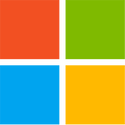
Microsoft Releases FY25 Q4 Earnings Report
Microsoft Corp. today announced the following results for the quarter ended June 30, 2025, as compared to the corresponding period of last fiscal year:
- Revenue was $76.4 billion and increased 18% (up 17% in constant currency)
- Operating income was $34.3 billion and increased 23% (up 22% in constant currency)
- Net income was $27.2 billion and increased 24% (up 22% in constant currency)
- Diluted earnings per share was $3.65 and increased 24% (up 22% in constant currency)

Qualcomm Announces Third Quarter Fiscal 2025 Results
Qualcomm Incorporated (NASDAQ: QCOM) today announced results for its fiscal third quarter ended June 29, 2025.
"Another quarter of strong growth in QCT Automotive and IoT revenues further validates our diversification strategy and confidence in achieving our long-term revenue targets," said Cristiano Amon, President and CEO of Qualcomm Incorporated. "Our leadership in AI processing, high-performance and low-power computing and advanced connectivity positions us to become the industry platform of choice as AI gains scale at the edge."
"Another quarter of strong growth in QCT Automotive and IoT revenues further validates our diversification strategy and confidence in achieving our long-term revenue targets," said Cristiano Amon, President and CEO of Qualcomm Incorporated. "Our leadership in AI processing, high-performance and low-power computing and advanced connectivity positions us to become the industry platform of choice as AI gains scale at the edge."

Western Digital Reports Fiscal Fourth Quarter and Fiscal Year 2025 Financial Results
Western Digital Corp. today reported fiscal fourth quarter and fiscal year 2025 financial results for the period ended June 27, 2025.
Q4FY25 Highlights:
Q4FY25 Highlights:
- Revenue of $2.61 billion, up 30% year over year
- GAAP diluted EPS of $0.67 and non-GAAP diluted EPS of $1.66
- Cash flow from operations of $746 million; free cash flow of $675 million
- Fiscal year 2025 revenue of $9.52 billion, up 51% year over year.
- Q1FY26 revenue expected to be up 22% year over year at mid-point
Chinese CPU Maker Zhaoxin Targets AMD EPYC with 96-Core KH-50000 and Debuts AI-Ready KX-7000N Processor Series
Chinese fabless CPU maker Zhaoxin announced two next-generation processors at the World Artificial Intelligence Conference 2025: the server-class Kaisheng KH-50000 and the AI-enabled consumer KaiXian KX-7000N. The Kaisheng KH-50000 represents a substantial upgrade from its predecessor, featuring 96 cores compared to the current generation's 32 cores. This positions it directly against AMD's EPYC 9004 Genoa series with matching specifications. The processor operates at clock speeds between 2.2 GHz and 3.0 GHz, though Zhaoxin has not confirmed whether simultaneous multithreading is supported. Memory and cache specifications include 384 MB of L3 cache, six times larger than the KH-40000's capacity. The processor supports 12-channel DDR5 ECC memory and provides 128 PCIe 5.0 lanes with Compute Express Link interconnect capability. Multi-socket support through ZPI 5.0 allows configurations with two or four processors, enabling systems with up to 384 total cores. Its current KH-40000 series uses Zhaoxin's Yongfeng architecture. However, the significant performance improvements and feature additions showcased hints of a new (yet to be disclosed) architecture for the KH-50000.
The KaiXian KX-7000N marks Zhaoxin's entry into AI-capable consumer processors. Based on the existing KX-7000 design, it incorporates a neural processing unit for AI workloads. The processor features increased core counts, however the company didn't provide any numbers (the KX-7000 has eight cores). It also gets an upgrade from PCIe 4.0 to PCIe 5.0 support. Zhaoxin demonstrated several AI PC systems using the KX-7000N at the conference but provided limited technical specifications.
The KaiXian KX-7000N marks Zhaoxin's entry into AI-capable consumer processors. Based on the existing KX-7000 design, it incorporates a neural processing unit for AI workloads. The processor features increased core counts, however the company didn't provide any numbers (the KX-7000 has eight cores). It also gets an upgrade from PCIe 4.0 to PCIe 5.0 support. Zhaoxin demonstrated several AI PC systems using the KX-7000N at the conference but provided limited technical specifications.
Enfabrica Unveils Industry's First Ethernet-Based AI Memory Fabric System
Enfabrica Corporation, an industry leader in high-performance networking silicon for artificial intelligence (AI) and accelerated computing, today announced the availability of its Elastic Memory Fabric System "EMFASYS", a transformative hardware and software solution designed to dramatically improve the compute efficiencies in large-scale, distributed, memory-bound AI inference workloads. EMFASYS is the first commercially available system that integrates high-performance Remote Direct Memory Access (RDMA) Ethernet networking with an abundance of parallel ComputeExpressLink (CXL) based DDR5 memory channels. The solution provides AI compute racks with fully elastic memory bandwidth and memory capacity, in a standalone appliance reachable by any GPU server at low, bounded latency over existing network ports.
Generative, agentic, and reasoning-driven AI workloads are growing exponentially—in many cases requiring 10 to 100 times more compute per query than previous Large Language Model (LLM) deployments and accounting for billions of batched inference calls per day across AI clouds. The EMFASYS solution addresses the critical need for AI clouds to extract the highest possible utilization of GPU and High-Bandwidth-Memory (HBM) resources in the compute rack while scaling to greater user/agent count, accumulated context, and token volumes. It achieves this outcome by dynamically offloading HBM to commodity DRAM using a caching hierarchy, load-balancing token generation across AI servers, and reducing stranding of expensive GPU cores. When deployed at scale with Enfabrica's EMFASYS remote memory software stack, the solution enables up to 50% lower cost per token per user, allowing foundational LLM providers to deliver significant savings in a price/performance tiered model.
Generative, agentic, and reasoning-driven AI workloads are growing exponentially—in many cases requiring 10 to 100 times more compute per query than previous Large Language Model (LLM) deployments and accounting for billions of batched inference calls per day across AI clouds. The EMFASYS solution addresses the critical need for AI clouds to extract the highest possible utilization of GPU and High-Bandwidth-Memory (HBM) resources in the compute rack while scaling to greater user/agent count, accumulated context, and token volumes. It achieves this outcome by dynamically offloading HBM to commodity DRAM using a caching hierarchy, load-balancing token generation across AI servers, and reducing stranding of expensive GPU cores. When deployed at scale with Enfabrica's EMFASYS remote memory software stack, the solution enables up to 50% lower cost per token per user, allowing foundational LLM providers to deliver significant savings in a price/performance tiered model.

Lexar Launches PLAY 2280 SE PCIe 4.0 4 TB Internal SSD for PlayStation 5
Lexar, a leading global brand of flash memory solutions, is excited to announce the Lexar PLAY 2280 SE PCIe 4.0 4 TB SSD. This drive delivers 7000 MB/s max read and 6000 MB/s max write speeds to reduce load times and deliver seamless gameplay on PlayStation 5 consoles. Built to complement the PS5, the Lexar PLAY 2280 SE PCIe 4.0 4 TB SSD enhances the gaming experience unique heatsink that helps maintain optimal performance during intense gaming sessions and, with 4 TB of additional storage, the drive can hold up to 100 AAA games.
"If you're a gamer who needs storage to keep up with your growing library, the Lexar PLAY 2280 SE SSD provide the performance, space, and reliability you need to jump into action quickly and with a competitive edge" said Joey Lopez, Director of Brand Marketing.
"If you're a gamer who needs storage to keep up with your growing library, the Lexar PLAY 2280 SE SSD provide the performance, space, and reliability you need to jump into action quickly and with a competitive edge" said Joey Lopez, Director of Brand Marketing.

AMD to Rehash Ryzen 8000G Desktop APUs as 9000G Series: Rumor
It looks like AMD is refreshing its Ryzen 8000G desktop APUs as the newer Ryzen 9000G series, these chips will be powered by the older "Zen 4" microarchitecture, and not the latest "Zen 5," suggests a credible rumor on ChipHell. It was anticipated that the Ryzen 9000G series would be based on the 4 nm "Strix Point" monolithic silicon, or its updated variant, "Krackan Point." The chip features a dual-CCX CPU component with one CCX packing four "Zen 5" cores sharing 16 MB of L3 cache, and the second CCX featuring eight "Zen 5c" cores sharing an 8 MB L3 cache. The "Zen 5c" cores operate at lower average clock speeds than "Zen 5," and hence don't need large amounts of last-line cache. "Strix Point" also features a large RDNA 3.5 iGPU with 16 compute units, and most importantly, a powerful NPU with 50 AI TOPS, which meets Microsoft Copilot+ requirements. This is not going to be the case for the Ryzen 9000G, if the rumor is true.
If based on the older 4 nm "Hawk Point" silicon, the 9000G series will feature a single CCX CPU with eight full-size "Zen 4" cores sharing a 16 MB L3 cache; and an RDNA 3 based iGPU with 12 compute units, but unfortunately a much slower NPU with only 16 TOPS of throughput, which doesn't meet Copilot+ requirements. Perhaps the only things differentiating the 9000G series from the 8000G series are minor speed bumps, around 200 MHz increases in CPU clock speeds across the board, and a 100 MHz increase in iGPU engine clocks. All is not lost, as the non-socketed mobile Ryzen AI 300 "Strix Point" processor can be had in plenty of MoD (mobile-on-desktop) mini PCs, and we can see from recent product launches that PC OEMs are all over the Ryzen AI Max "Strix Halo" chip, putting it into prebuilt desktops.
If based on the older 4 nm "Hawk Point" silicon, the 9000G series will feature a single CCX CPU with eight full-size "Zen 4" cores sharing a 16 MB L3 cache; and an RDNA 3 based iGPU with 12 compute units, but unfortunately a much slower NPU with only 16 TOPS of throughput, which doesn't meet Copilot+ requirements. Perhaps the only things differentiating the 9000G series from the 8000G series are minor speed bumps, around 200 MHz increases in CPU clock speeds across the board, and a 100 MHz increase in iGPU engine clocks. All is not lost, as the non-socketed mobile Ryzen AI 300 "Strix Point" processor can be had in plenty of MoD (mobile-on-desktop) mini PCs, and we can see from recent product launches that PC OEMs are all over the Ryzen AI Max "Strix Halo" chip, putting it into prebuilt desktops.

PlayStation 6 Leak Reveals Orion and Canis APUs for Home Console and Handheld System
PlayStation 6 development has taken an interesting turn as recent leaks suggest that Sony plans to use two platforms for its next-gen gaming system. Recent information from Moore's Law is Dead, as Notebookcheck reports, shows that the company is working on two different AMD-powered APUs. They've even given them star-themed codenames: Orion and Canis. The Orion APU will be the heart of Sony's main PlayStation 6 console. Canis, on the other hand, is something new: a handheld gaming device. It's not just a PS5 offshoot, but a key part of the upcoming PS6 lineup. This handheld system is expected to be able to play games from three console generations. It supports PS4, PS5, and PS6 titles, with options to play at 1080p or 720p. The recent introduction of power-saving functionality on PlayStation 5, which dynamically adjusts performance to reduce energy consumption, appears to validate earlier predictions about Sony's handheld ambitions.
Sony's vision goes beyond just making different hardware. The shared CPU and GPU design in both APUs can make development easier, which might cut costs and make things simpler for game makers. The handheld version could work as a portable gaming device and a smaller home console option, giving Sony a way to attract budget-minded buyers and current PS4 users. Last but not least, Sony's shift from Shakespearean codenames used during PS5 development to astronomical nomenclature signals a new chapter in PlayStation evolution, with additional specifications and pricing details expected in upcoming months.
Sony's vision goes beyond just making different hardware. The shared CPU and GPU design in both APUs can make development easier, which might cut costs and make things simpler for game makers. The handheld version could work as a portable gaming device and a smaller home console option, giving Sony a way to attract budget-minded buyers and current PS4 users. Last but not least, Sony's shift from Shakespearean codenames used during PS5 development to astronomical nomenclature signals a new chapter in PlayStation evolution, with additional specifications and pricing details expected in upcoming months.

AGON by AOC × Counter-Strike 2 CS24A and AG246FK6 Monitors Deliver World-Class 610 Hz Performance
AGON by AOC—the world's leading gaming monitor brand—unveils two groundbreaking 24.1-inch (61.21 cm) esports monitors that join the elite ranks of the world's fastest LCDs with an incredible 600 Hz performance, overclockable to 610 Hz. The AGON PRO CS24A, created in collaboration with Counter-Strike 2, and its counterpart in the well-known brand design, the AGON PRO AG246FK6, represent the pinnacle of esports gaming technology, delivering the ultra-fast response times and revolutionary MBR+ (Motion Blur Reduction Plus) Backlight Strobing technology that professional players demand.
Counter-Strike has defined competitive FPS gaming for over two decades, serving as the proving ground where countless players took their first steps into esports. From LAN parties to packed arenas, CS has evolved from a mod into a global phenomenon that sets the standard for tactical shooters. The collaboration between AGON by AOC and Counter-Strike 2 brings together two leaders in competitive gaming, uniting the game that wrote the rule book for esports with monitors engineered to push those rules to their limits. As refresh rates have climbed from 144 Hz to 240 Hz and beyond, the CS24A now sets a new benchmark at 610 Hz, delivering the instantaneous response that Counter-Strike's precision gameplay demands.
Counter-Strike has defined competitive FPS gaming for over two decades, serving as the proving ground where countless players took their first steps into esports. From LAN parties to packed arenas, CS has evolved from a mod into a global phenomenon that sets the standard for tactical shooters. The collaboration between AGON by AOC and Counter-Strike 2 brings together two leaders in competitive gaming, uniting the game that wrote the rule book for esports with monitors engineered to push those rules to their limits. As refresh rates have climbed from 144 Hz to 240 Hz and beyond, the CS24A now sets a new benchmark at 610 Hz, delivering the instantaneous response that Counter-Strike's precision gameplay demands.
Clair Obscur: Expedition 33 Patch 1.4.0 Brings Frame Generation and Low Latency Mode Support for DLSS and XeSS
Sandfall Interactive has released the newest Clair Obscur: Expedition 33 Patch 1.4.0, adding Frame Generation and Low Latency Mode support for both DLSS and XeSS, as well as bringing some requested quality-of-life (QoL) additions like the Battle Retry Prompt. While the support for DLSS Frame Generation was already available for Clair Obscur: Expedition 33 via a mod (behind Patreon), it is great that Sandfall Interactive has now added the official support. In addition, the new 1.4.0 update also fixes some general bugs, improves visuals, and brings some requested QoL updates.
According to the release notes, the biggest update is the Frame Generation and Low Latency Mode support for both DLSS and XeSS (on compatible GPUs), which promises smoother gameplay and lower input lag. In addition, Sandfall Interactive also added the Batter Retry Prompt, which is a new pop-up window that appears after defeat and gives you an option to quickly retry the battle. Apparently, this was one of the most requested additions. Other QoL improvements include Lumina cost display, autoplay dialogue, and separate volume sliders for different phases in the game.
According to the release notes, the biggest update is the Frame Generation and Low Latency Mode support for both DLSS and XeSS (on compatible GPUs), which promises smoother gameplay and lower input lag. In addition, Sandfall Interactive also added the Batter Retry Prompt, which is a new pop-up window that appears after defeat and gives you an option to quickly retry the battle. Apparently, this was one of the most requested additions. Other QoL improvements include Lumina cost display, autoplay dialogue, and separate volume sliders for different phases in the game.
D-Wave Quantum Announces Strategic Development Initiative for Advanced Cryogenic Packaging
D-Wave Quantum Inc., a leader in quantum computing systems, software, and services, today announced a new strategic development initiative focused on advanced cryogenic packaging. Designed to advance and scale both gate model and annealing quantum processor development, the initiative builds on D-Wave's technology leadership in superconducting cryogenic packaging and will expand the company's multi-chip packaging capabilities, equipment, and processes. By bolstering its manufacturing efforts with state-of-the-art technology, D-Wave aims to accelerate its cross-platform technology development efforts while maintaining and expanding fundamental components of its supply chain.
As part of this initiative, D-Wave is leveraging deep expertise and processes at the NASA Jet Propulsion Laboratory ("JPL"), a research and development lab federally funded by NASA and managed by Caltech. Harnessing JPL's superconducting bump-bond process, D-Wave has demonstrated end-to-end superconducting interconnect between chips, work that D-Wave expects will serve as an important foundation for scaling both D-Wave's annealing architectures and its fluxonium-based gate-model architectures. D-Wave believes that superconducting bump bonds will be key to the scalable control of fluxonium and to interconnectivity in multi-chip quantum processor architectures. D-Wave is also acquiring equipment and developing processes with a goal to increase circuit densities in its pioneering superconducting printed-circuit-board ("PCB") manufacturing, required for both scaling to larger processors and supporting analog-digital quantum computing technology.
As part of this initiative, D-Wave is leveraging deep expertise and processes at the NASA Jet Propulsion Laboratory ("JPL"), a research and development lab federally funded by NASA and managed by Caltech. Harnessing JPL's superconducting bump-bond process, D-Wave has demonstrated end-to-end superconducting interconnect between chips, work that D-Wave expects will serve as an important foundation for scaling both D-Wave's annealing architectures and its fluxonium-based gate-model architectures. D-Wave believes that superconducting bump bonds will be key to the scalable control of fluxonium and to interconnectivity in multi-chip quantum processor architectures. D-Wave is also acquiring equipment and developing processes with a goal to increase circuit densities in its pioneering superconducting printed-circuit-board ("PCB") manufacturing, required for both scaling to larger processors and supporting analog-digital quantum computing technology.
Manli Intros Nebula GeForce RTX 5090 Graphic Cards
Manli introduced its newest high-end graphics card, the Nebula GeForce RTX 5090 powered by the NVIDIA Blackwell architecture. This card is Manli's fourth RTX 5090 version and the first time a flagship GPU model has joined Manli's Nebula lineup alongside the Gallardo and Stellar RTX 5090 series. The Nebula RTX 5090 runs at base and boost clock speeds of 2017 MHz and 2407 MHz respectively. The card has 32 GB of GDDR7 memory with a 512-bit interface providing memory speeds of 28.0 Gbps and bandwidth up to 1,792 GB/s.
The graphics card needs 575 W of power and keeps its GPU temperature at a maximum of 90°C. In terms of cooling it features a large heatsink with a triple cooler setup. This includes three 100 mm fans (which stop spinning during idle states) and nine 6 mm heat pipes. For enhanced aesthetics and structural rigidity Manli's Nebula GeForce RTX 5090 features a die-cast cover and a metal backplate. Connectivity-wise, the graphics card offers three DisplayPort outputs and one HDMI port. It measures 345 x 150 x 65 mm and takes up 3.5 slots. It's worth noting that this model is intended for international markets, unlike the 5090 D variants that Manli offers specifically to the Chinese market. Exact pricing and availability are yet to be known.
The graphics card needs 575 W of power and keeps its GPU temperature at a maximum of 90°C. In terms of cooling it features a large heatsink with a triple cooler setup. This includes three 100 mm fans (which stop spinning during idle states) and nine 6 mm heat pipes. For enhanced aesthetics and structural rigidity Manli's Nebula GeForce RTX 5090 features a die-cast cover and a metal backplate. Connectivity-wise, the graphics card offers three DisplayPort outputs and one HDMI port. It measures 345 x 150 x 65 mm and takes up 3.5 slots. It's worth noting that this model is intended for international markets, unlike the 5090 D variants that Manli offers specifically to the Chinese market. Exact pricing and availability are yet to be known.
TECO Electric & Machinery and Hon Hai Technology Group Announce Strategic Alliance Targeting AI Data Center Capabilities
TECO Electric & Machinery Co Ltd ("TECO") and Hon Hai Technology Group ("Foxconn") held a major press conference today (30th) at the Taiwan Stock Exchange to announce a strategic alliance through a board-approved share exchange. This partnership combines TECO's strengths in electromechanical systems with Foxconn's expertise in ICT to seize the global trend of AI data center development toward standardization and modularization, jointly tapping into vast AI data center (AIDC) business opportunities worldwide. Going forward, the strategic alliance will explore the possibility of expanding cooperation in Foxconn's "3+3+3" areas.
According to terms approved by both boards, respectively, TECO will take a 0.519% stake in Foxconn. In turn, Foxconn will own 10% in TECO. The latter will issue 237,644,068 new shares to Foxconn, and Foxconn will issue 72,481,441 new shares to TECO, implying a share exchange ratio of approx. 1 to 0.305. The no-cash transaction is targeted to complete in the fourth quarter of this year, conditional on regulatory approvals.
According to terms approved by both boards, respectively, TECO will take a 0.519% stake in Foxconn. In turn, Foxconn will own 10% in TECO. The latter will issue 237,644,068 new shares to Foxconn, and Foxconn will issue 72,481,441 new shares to TECO, implying a share exchange ratio of approx. 1 to 0.305. The no-cash transaction is targeted to complete in the fourth quarter of this year, conditional on regulatory approvals.

AMD Readies Four New Ryzen 9000 Desktop CPUs, Including Three PRO Chips
AMD is preparing to launch four new Ryzen 9000 series Socket AM5 desktop processor models, which include three Ryzen PRO series models targeting commercial desktops, and an interesting consumer segment SKU designed to compete under the $300-mark. These include the Ryzen 9 PRO 9945, Ryzen 7 PRO 9745, and the Ryzen 5 PRO 9645 in the commercial segment, and the Ryzen 7 9700F in the consumer segment. All four processor models are based on the "Granite Ridge" MCM, powered by the "Zen 5" microarchitecture.
The Ryzen 9 PRO 9945 is a 12-core/24-thread chip with six cores per CCD, and a total cache of 76 MB (12x 1 MB L2 + 2x 32 MB L3). It comes with a base frequency of 3.40 GHz, and a TDP of 65 W. Next up, is the Ryzen 7 PRO 9745, which is an 8-core/16-thread chip with a 3.80 GHz base frequency, 40 MB of total cache, and 65 W TDP. The Ryzen 5 PRO 9645 is a 6-core/12-thread chip with 3.90 GHz base frequency, 38 MB total cache, and 65 W. The consumer segment Ryzen 7 9700F is essentially the same chip as the Ryzen 7 9700X, but lacks integrated graphics, and could end up priced about $20 less, or around $280. The three Ryzen PRO chips come with AMD PRO feature-set that's analogous to Intel vPro, offering remote management and data security features not available to the regular Ryzen processor models.
The Ryzen 9 PRO 9945 is a 12-core/24-thread chip with six cores per CCD, and a total cache of 76 MB (12x 1 MB L2 + 2x 32 MB L3). It comes with a base frequency of 3.40 GHz, and a TDP of 65 W. Next up, is the Ryzen 7 PRO 9745, which is an 8-core/16-thread chip with a 3.80 GHz base frequency, 40 MB of total cache, and 65 W TDP. The Ryzen 5 PRO 9645 is a 6-core/12-thread chip with 3.90 GHz base frequency, 38 MB total cache, and 65 W. The consumer segment Ryzen 7 9700F is essentially the same chip as the Ryzen 7 9700X, but lacks integrated graphics, and could end up priced about $20 less, or around $280. The three Ryzen PRO chips come with AMD PRO feature-set that's analogous to Intel vPro, offering remote management and data security features not available to the regular Ryzen processor models.

Logitech Announces Q1 Fiscal Year 2026 Results
Logitech International today announced financial results for the first quarter of Fiscal Year 2026.
- Sales were $1.15 billion, up 5 percent in US dollars and 5 percent in constant currency, compared to Q1 of the prior year.
- GAAP gross margin was 41.7 percent, down 110 basis points, compared to Q1 of the prior year. Non-GAAP gross margin was 42.1 percent, down 120 basis points, compared to Q1 of the prior year.
- GAAP operating income was $162 million, up 6 percent, compared to Q1 of the prior year. Non-GAAP operating income was $202 million, up 11 percent, compared to Q1 of the prior year.
- GAAP earnings per share (EPS) was $0.98, up 7 percent compared to Q1 of the prior year. Non-GAAP EPS was $1.26, up 12 percent compared to Q1 of the prior year.
- Cash flow from operations was $125 million. The quarter-ending cash balance was $1.5 billion.
- The Company returned $122 million of cash to shareholders through share repurchases.

MSI Prestige 16 AI+ Mercedes-AMG Motorsport Limited Edition Laptop Now Available
MSI, a world-leading premium laptop brand renowned for its luxurious aesthetics, extreme performance, and innovative technology, proudly announces the global availability of the Prestige 16 AI+ Mercedes-AMG Motorsport Limited Edition. This exclusive collaboration combines MSI's advanced engineering with the iconic spirit of Mercedes-AMG Motorsport, creating a laptop that embodies precision, performance, and unmistakable style.
"The Prestige 16 AI+ Mercedes-AMG Motorsport Edition is more than just a laptop; it's a statement of design excellence," said Eric Kuo, Executive Vice President & NB BU GM of MSI. "Like all our Business & Productivity models, it offers a thin and light design, rich connectivity, and strong security. Through this AMG collaboration, we also aim to show MSI's commitment to delivering premium, reliable business laptops for everyone."
"The Prestige 16 AI+ Mercedes-AMG Motorsport Edition is more than just a laptop; it's a statement of design excellence," said Eric Kuo, Executive Vice President & NB BU GM of MSI. "Like all our Business & Productivity models, it offers a thin and light design, rich connectivity, and strong security. Through this AMG collaboration, we also aim to show MSI's commitment to delivering premium, reliable business laptops for everyone."
GAMEMAX Introduces AERIS 330 Series microATX PC Case
GAMEMAX, an emerging brand of PC gaming components including gaming cases and power supply units, proudly introduces the AERIS 330 Series, a bold and high-performance microATX PC case designed for gamers and PC builders who demand power, style, and efficiency in a compact form. Inspired by the strength and ferocity of a lion, the GAMEMAX AERIS 330 combines striking aesthetics with superior airflow and hardware compatibility, making it the perfect choice for modern gaming and workstation builds.
The GAMEMAX AERIS 330 is offered in two distinct variants, AERIS 330 Mesh and AERIS 330 Glass, each available in both black and white color options to suit a variety of build aesthetics. The AERIS 330 MW/MB is equipped with a mesh front panel, providing enhanced airflow and ventilation for improved thermal performance. In contrast, the AERIS 330 GW/GB features a tempered glass front panel, delivering a sleek, premium look while maintaining solid cooling capabilities. Both models come pre-installed with four GAMEMAX Tornado T12 ARGB fans, ensuring efficient cooling and vibrant RGB lighting straight out of the box.
The GAMEMAX AERIS 330 is offered in two distinct variants, AERIS 330 Mesh and AERIS 330 Glass, each available in both black and white color options to suit a variety of build aesthetics. The AERIS 330 MW/MB is equipped with a mesh front panel, providing enhanced airflow and ventilation for improved thermal performance. In contrast, the AERIS 330 GW/GB features a tempered glass front panel, delivering a sleek, premium look while maintaining solid cooling capabilities. Both models come pre-installed with four GAMEMAX Tornado T12 ARGB fans, ensuring efficient cooling and vibrant RGB lighting straight out of the box.
Grounded 2 Stacks Up To Be Smash Hit, Blasts Past Predecessor Mere Hours After Launch
Grounded 2 only just launched to Steam Early Access, and it has already broken its predecessor's record for concurrent Steam players. According to SteamDB, Grounded 2 has already attracted an all-time peak player count of 49,836 players, and that was a mere two hours after the game went live on Steam. That's compared to the original Grounded, which peaked at 32,012 players a year after it launched in Early Access. Since the launch Grounded 2 has plateaued somewhat, settling at around the 33,000-player mark, however, the game launched at the start of the week, and player counts tend to pick up around the first weekend after launch. It would not be surprising to see more players pick up Grounded 2 on its first weekend after launch, since the first game was quite successful over its five-year run. The launch of Grounded 2 resulted in a noticeable uptick in player counts for the original survival adventure game, to boot.
Grounded 2 builds on the premise of the first game, shrinking the protagonist down even smaller than before, revisiting the base-building and exploration mechanics in a larger open world with fresh twists, like insect breeding, new threats, and new challenges. Grounded 2 currently costs $29.99, and those who have played the new game and reviewed it on Steam have been impressed for the most part. The game currently has a 73% Positive Steam review rating from a total of 1,385 reviews. Grounded 2 is still in Early Access, and it will likely be for a while—the original Grounded game only exited Early Access over two years after its initial release. The launch price also saw a $10 increase when Grounded exited Early Access, so the same may be true for the sequel.
Grounded 2 builds on the premise of the first game, shrinking the protagonist down even smaller than before, revisiting the base-building and exploration mechanics in a larger open world with fresh twists, like insect breeding, new threats, and new challenges. Grounded 2 currently costs $29.99, and those who have played the new game and reviewed it on Steam have been impressed for the most part. The game currently has a 73% Positive Steam review rating from a total of 1,385 reviews. Grounded 2 is still in Early Access, and it will likely be for a while—the original Grounded game only exited Early Access over two years after its initial release. The launch price also saw a $10 increase when Grounded exited Early Access, so the same may be true for the sequel.
Tuesday, July 29th 2025
Today's Reviews
Cases
CPU Coolers
Headphones
Keyboards
Mouse
Networking
Speakers

MSI Claw 8 AI+ A2VM Review
The MSI Claw 8 is a high-end PC handheld equipped with beefy graphics, 1 TB of storage, 32 GB of fast memory, a massive 8-inch screen, and a huge battery. Its gaming prowess is impeccable, but is the software good enough to warrant a recommendation? Find out in our review.

Lenovo Legion 5i (15IRX10) Review - Feature-Rich and Wallet Friendly
The 15-inch 2025 Lenovo Legion 5i (15IRX10) is a capable gaming laptop that won't break the bank. It offers a surprisingly generous set of useful features for its price, including good performance, a decent base IPS display, a comfortable keyboard, and modern connectivity, alongside well-executed manual tuning options.
Kysona Launches Mercury: 41g, $69.99 Wireless Gaming Mouse With Flagship Internals "Built for Small Hands"
Kysona has recently made a name for itself in the ultralight wireless gaming mouse space with the launch of the Uranus Pro, and now it is following that launch up with the Mercury series, headed up by the Mercury Ultra, which packs a PixArt PAW3950 sensor, a 41 g weight with no holes, and Omron Optical Micro switches, which should be good for 70 million clicks. The Mercury Pro and Mercury SE both also feature similarly lightweight designs and identical dimensions, with lower pricing and slightly altered internals. The Mercury Ultra carries a $69.99 MSRP and $49.99 launch price, while the Mercury Pro is $49.99 but $32.99 at launch, and the Mercury SE is $29.99 with a $21.99 launch price. Currently, it is only available via the Kysona online store, but Kysona's products have previously been available on Amazon, so that seems like a matter of time, too.
Kysona says the Mercury is built for smaller hands, measuring in at just 118×63×38 mm, and it features a similar shape to the Pulsar X2 Crazylight we recently reviewed, albeit with some slight tweaks to the curvature on the sides and a slightly heavier weight of 41 g, measured without the skates. The Mercury SE weighs in at 40 g, which is 1 g lighter than the Mercury Pro and Ultra. The Mercury Ultra features Omron optical switches and a PAW3950 sensor, while the Pro and SE have Huano mechanical switches—100 million "transparent white" and 20 million "blue shell white dot," respectively. The Mercury SE also drops the 8 kHz polling featured in the Ultra and Pro versions and uses the PAW3311 sensor, while the Mercury Pro maintains 8 kHz polling with a PAW3395 sensor. Curiously, the Ultra and the SE share the same 300 mAh battery capacity, while the Pro version steps it up to 500 mAh. All three mice also feature both Bluetooth and 2.4 GHz wireless connectivity, with wired USB Type-C as an option as well. All three mice also have the same five buttons (including scroll wheel click), and they are all remappable with macro support, although only the Pro and SE support a web driver, while the Mercury Ultra requires the installation of software—which has recently been proven to be suboptimal.
Kysona says the Mercury is built for smaller hands, measuring in at just 118×63×38 mm, and it features a similar shape to the Pulsar X2 Crazylight we recently reviewed, albeit with some slight tweaks to the curvature on the sides and a slightly heavier weight of 41 g, measured without the skates. The Mercury SE weighs in at 40 g, which is 1 g lighter than the Mercury Pro and Ultra. The Mercury Ultra features Omron optical switches and a PAW3950 sensor, while the Pro and SE have Huano mechanical switches—100 million "transparent white" and 20 million "blue shell white dot," respectively. The Mercury SE also drops the 8 kHz polling featured in the Ultra and Pro versions and uses the PAW3311 sensor, while the Mercury Pro maintains 8 kHz polling with a PAW3395 sensor. Curiously, the Ultra and the SE share the same 300 mAh battery capacity, while the Pro version steps it up to 500 mAh. All three mice also feature both Bluetooth and 2.4 GHz wireless connectivity, with wired USB Type-C as an option as well. All three mice also have the same five buttons (including scroll wheel click), and they are all remappable with macro support, although only the Pro and SE support a web driver, while the Mercury Ultra requires the installation of software—which has recently been proven to be suboptimal.
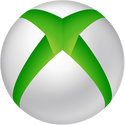
ASUS ROG Xbox Ally Pre-Order Date and Pricing Leak Ahead of Apparent Gamescom Launch
New leaks about the upcoming ASUS ROG Xbox Ally point to an earlier-than-expected pre-order date. According to Dealabs and @billbil_kun on X, the Xbox-branded gaming handheld will be available for pre-order on August 20, aligning with the opening day of Gamescom 2025. Xbox Wire notes that there is a Gamescom presentation "featuring the ROG Xbox Ally handhelds," scheduled for August 20 at 3 PM CEST. The new gaming handheld will be available in two versions. The eight-core AMD Ryzen AI Z2 Extreme will power the Xbox Ally X, and the quad-core AMD Ryzen Z2 A will be the core of the vanilla Xbox Ally. The Xbox Ally also comes with less RAM and storage than the Xbox Ally X, with the latter featuring 24 GB of LPDDR5x-8000 RAM and a 1 TB SSD, while the former has just 16 GB of LPDDR5x-6400 and a 512 GB SSD.
With the exception of the single USB4 port on the Xbox Ally X not making it to the Xbox Ally, and a larger 80 Wh battery in the Ally X, the two devices are otherwise more or less identical. Previous leaks have indicated that the expected price of the Xbox Ally X will fall around the €899 mark, while the less powerful Xbox Ally will cost around €599 in Europe. It's unclear how these prices will translate to the US, but the current All-Digital Xbox Series X costs €549 in the EU and $549 in the US, so it's likely that the US pricing for the ASUS ROG Xbox Ally and Xbox Ally X will also be a 1:1 conversion rather than following regional pricing.
With the exception of the single USB4 port on the Xbox Ally X not making it to the Xbox Ally, and a larger 80 Wh battery in the Ally X, the two devices are otherwise more or less identical. Previous leaks have indicated that the expected price of the Xbox Ally X will fall around the €899 mark, while the less powerful Xbox Ally will cost around €599 in Europe. It's unclear how these prices will translate to the US, but the current All-Digital Xbox Series X costs €549 in the EU and $549 in the US, so it's likely that the US pricing for the ASUS ROG Xbox Ally and Xbox Ally X will also be a 1:1 conversion rather than following regional pricing.

Cooler Master Announces North American Availability of MasterFrame 500 Mesh
Cooler Master, a global leader in innovative thermal solutions and PC hardware, today announced North American availability of the MasterFrame 500 Mesh, a premium open-frame ATX chassis built for extreme cooling and straightforward customization. Developed under Cooler Master's FreeForm 2.0 design philosophy, it gives builders the structure, airflow, and files they need to tailor the frame to their vision.
The chassis features an exposed exo-structure, mesh panels for stronger airflow, support for Mini-ITX to E-ATX motherboards, and GPU clearance up to 390 mm. ARGB and non-ARGB versions both ship with dual SickleFlow 200 mm front fans and a 120 mm rear fan. With room for up to eight fans and two 360 mm radiators, the platform is ready for high thermal loads, silent tuning, or both.
The chassis features an exposed exo-structure, mesh panels for stronger airflow, support for Mini-ITX to E-ATX motherboards, and GPU clearance up to 390 mm. ARGB and non-ARGB versions both ship with dual SickleFlow 200 mm front fans and a 120 mm rear fan. With room for up to eight fans and two 360 mm radiators, the platform is ready for high thermal loads, silent tuning, or both.

Seagate Technology Reports Fiscal Fourth Quarter and Fiscal Year 2025 Financial Results
Seagate Technology Holdings plc (NASDAQ: STX) (the "Company" or "Seagate"), a leading innovator of mass-capacity data storage, today reported financial results for its fiscal fourth quarter and fiscal year ended June 27, 2025.
"Seagate's strong FQ4 performance underscores our commitment to profitable growth, marked by a 30% year-over-year revenue increase, record gross margin, and non-GAAP EPS expanding to the top of our guidance range. These achievements reflect the structural enhancements we've implemented in our business and ongoing demand strength from cloud customers for our high-capacity drives," said Dave Mosley, Seagate's chief executive officer. "We continue to execute our areal density-leading HAMR product qualifications and ramp plans, positioning Seagate to address customer demand growth for mass data storage across the cloud and at the edge. We are confident in our ability to create exceptional value for our customers and shareholders over the long-term," Mosley concluded.
"Seagate's strong FQ4 performance underscores our commitment to profitable growth, marked by a 30% year-over-year revenue increase, record gross margin, and non-GAAP EPS expanding to the top of our guidance range. These achievements reflect the structural enhancements we've implemented in our business and ongoing demand strength from cloud customers for our high-capacity drives," said Dave Mosley, Seagate's chief executive officer. "We continue to execute our areal density-leading HAMR product qualifications and ramp plans, positioning Seagate to address customer demand growth for mass data storage across the cloud and at the edge. We are confident in our ability to create exceptional value for our customers and shareholders over the long-term," Mosley concluded.

Electronic Arts Reports Q1 FY26 Results
Electronic Arts today announced preliminary financial results for its first quarter ended June 30, 2025.
"We delivered a strong start to FY26, outperforming expectations ahead of what will be the most exciting launch slate in EA's history," said Andrew Wilson, CEO of Electronic Arts. "From deepening player engagement in EA SPORTS to gearing up for Battlefield 6 and skate., we're scaling our global communities and continuing to shape the future of interactive entertainment."
"We delivered a strong start to FY26, outperforming expectations ahead of what will be the most exciting launch slate in EA's history," said Andrew Wilson, CEO of Electronic Arts. "From deepening player engagement in EA SPORTS to gearing up for Battlefield 6 and skate., we're scaling our global communities and continuing to shape the future of interactive entertainment."

Corsair AI Workstation 300 Launches As Latest in Flurry of AMD Ryzen AI Max+ 395 Mini PCs
Following yesterday's launch of the AMD Ryzen AI Max+ 395-powered Ayaneo Next 2, Corsair has announced yet another small-form-factor PC powered by AMD's Strix Halo APU. The Corsair AI Workstation 300, however, is a small-form-factor desktop PC measuring in at just 96.5 × 188.4 × 247.5 mm and launching at a pricey $1,599.99. That starting price only gets you into the eight-core AMD Ryzen AI Max 385, though, with the 16-core Ryzen AI Max+ 395 coming in at a staggering $1,999.99. The system offers up to 128 GB of RAM and 4 TB of NVMe SSD storage. The fully kitted-out system with the AI Max+ 395 APU, 128 GB RAM, and 4 TB SSD comes in at $2,299.99 from Corsair directly. The whole system is also powered by an internal 350 W flex ATX PSU, which should give the APU plenty of power for intensive tasks without having to have an external power brick.
Corsair's model is based on the same chassis as a design by Sixunited, whose Strix Halo Mini ITX motherboards were recently featured here as well. Just like those aforementioned motherboard designs, the Corsair AI Workstation 300 is built around LPDDR5x-8000 RAM, and even the starting configuration features 64 GB of RAM, communicating the workstation's intended workload as an AI workstation rather than a compact gaming system. The AI Workstation 300 ships with Corsair's AI Software Suite, which includes Amuse AI, an image generator based on Stable Diffusion and AMD Super Resolution, and Jan AI, an offline, open-source AI assistant based on Llama 3 and Mistral. Given the limitations of the small chassis, the AI Workstation 300 features a reasonably healthy IO selection, with an SD 4.0 card reader, 1× USB4 port, 2× USB 3.2 Gen 2 Type-A ports, and a 3.5 mm combo jack on the front. The rear has 1× HDMI 2.1, 1× DP 1.4, 1× USB4, 1× USB 3.2 Gen 2 Type-A, 1× 2.5 GbE, and 1× 3.5 mm headphone/microphone combo jack.
Corsair's model is based on the same chassis as a design by Sixunited, whose Strix Halo Mini ITX motherboards were recently featured here as well. Just like those aforementioned motherboard designs, the Corsair AI Workstation 300 is built around LPDDR5x-8000 RAM, and even the starting configuration features 64 GB of RAM, communicating the workstation's intended workload as an AI workstation rather than a compact gaming system. The AI Workstation 300 ships with Corsair's AI Software Suite, which includes Amuse AI, an image generator based on Stable Diffusion and AMD Super Resolution, and Jan AI, an offline, open-source AI assistant based on Llama 3 and Mistral. Given the limitations of the small chassis, the AI Workstation 300 features a reasonably healthy IO selection, with an SD 4.0 card reader, 1× USB4 port, 2× USB 3.2 Gen 2 Type-A ports, and a 3.5 mm combo jack on the front. The rear has 1× HDMI 2.1, 1× DP 1.4, 1× USB4, 1× USB 3.2 Gen 2 Type-A, 1× 2.5 GbE, and 1× 3.5 mm headphone/microphone combo jack.

Firefox Previews "Link to Text Highlight" Feature in Latest Nightly Build
With the latest Firefox Nightly build, Mozilla is testing what it calls "Copy Link to Highlight," which allows you to create links to a specific string of text on a webpage by highlighting it. The feature works exactly the same way as it does in Google's Chromium. After highlighting text, there is an option in the context menu to copy a link to the highlighted text, which produces a link with the same "#:~:text=" tag that Chromium browsers have had for years. Of course, this being Firefox, there is also an option to copy a clean link to the highlight, which will strip unwanted things like trackers and affiliate links from the highlight link. When opening a link with the text highlight tag, browsers will direct you to the highlighted text—helpful for those times when you want to share a snippet of a website without taking a screenshot.
The highlighted text link is available in Firefox Nightly build 143.0a1, which is available on Linux, macOS, and Windows. There is no indication if this feature will make it to the Android version of the browser, and the feature is currently being held in Nightly for testing until the development team can be certain it's stable. Mozilla is also testing an API to enable Firefox extensions to detect if the recently added vertical tabs feature is enabled or not. This should enable extension developers to inform users if their extension is incompatible with vertical tabs and adjust the extension UI if need be. There are also a number of bug fixes in the nightly build as well, including fixes for the built-in unit converter and a bunch of minor UI fixes to features like the New Tab page and certain search features. Read the full release notes here for more details.
The highlighted text link is available in Firefox Nightly build 143.0a1, which is available on Linux, macOS, and Windows. There is no indication if this feature will make it to the Android version of the browser, and the feature is currently being held in Nightly for testing until the development team can be certain it's stable. Mozilla is also testing an API to enable Firefox extensions to detect if the recently added vertical tabs feature is enabled or not. This should enable extension developers to inform users if their extension is incompatible with vertical tabs and adjust the extension UI if need be. There are also a number of bug fixes in the nightly build as well, including fixes for the built-in unit converter and a bunch of minor UI fixes to features like the New Tab page and certain search features. Read the full release notes here for more details.
Tachyum Enhances Prodigy Universal Processor Behind eBPF Port
Tachyum today announced that it has successfully ported the eBPF Just-In-Time (JIT) compiler on its Prodigy Universal Processor software emulation platform.
eBPF is a technology that can run sandboxed programs in a privileged context, such as the operating system kernel. It is used to extend the capabilities of the kernel safely and efficiently without requiring changes to the kernel source code or having to load kernel modules. Uses include kernel tracking, profiling and debugging; performance profiling; network packing filtering; security policies and events; and task scheduling. eBPF JIT is around 10 times faster than a generic eBPF interpreter.
eBPF is a technology that can run sandboxed programs in a privileged context, such as the operating system kernel. It is used to extend the capabilities of the kernel safely and efficiently without requiring changes to the kernel source code or having to load kernel modules. Uses include kernel tracking, profiling and debugging; performance profiling; network packing filtering; security policies and events; and task scheduling. eBPF JIT is around 10 times faster than a generic eBPF interpreter.

Razer Launches BlackShark V3 Pro Wireless Headset for Esports
Razer, the leading global lifestyle brand for gamers, today announced the launch of the Razer BlackShark V3 Pro lineup—an evolution of its iconic esports headset series. Designed for peak competitive performance, the new lineup includes platform-optimized models for PC, PlayStation, and Xbox, each delivering ultra-low latency wireless audio, crystal-clear voice communication, and tailored sound tuning.
"The BlackShark series has long been a trusted choice among competitive gamers," said Jeffrey Chau, Global Esports Director at Razer. "With the BlackShark V3 Pro line, we've refined the essentials—sound quality, comfort, and noise isolation—based on direct feedback from esports professionals. Now, with the fastest wireless performance and ultra-low latency audio, every detail is tuned to meet the demands of today's top players, delivering the clarity, speed, and focus they need to perform at their best."
"The BlackShark series has long been a trusted choice among competitive gamers," said Jeffrey Chau, Global Esports Director at Razer. "With the BlackShark V3 Pro line, we've refined the essentials—sound quality, comfort, and noise isolation—based on direct feedback from esports professionals. Now, with the fastest wireless performance and ultra-low latency audio, every detail is tuned to meet the demands of today's top players, delivering the clarity, speed, and focus they need to perform at their best."
SEMI Reports Worldwide Silicon Wafer Shipments Increase 10% Year-on-Year in Q2 2025
The SEMI Silicon Manufacturers Group (SMG) reported, in its quarterly analysis of the silicon wafer industry, that worldwide silicon wafer shipments increased 9.6% year-on-year to 3,327 million square inches (MSI) from the 3,035 MSI recorded during the same quarter of 2024. Sequentially, shipments grew 14.9% quarter-over-quarter from the 2,896 MSI recorded during the first quarter of this year, indicating emerging signs of recovery for select business sectors outside of memory.
"The silicon wafer demand for AI data-center chips, including high-bandwidth memory (HBM), continues to be very strong," said Lee Chungwei (李崇偉), Chairman of SEMI SMG and Vice President and Chief Auditor at GlobalWafers. "Fab utilization for other devices generally remains low, although inventory levels appear to be normalizing. While the direction of silicon shipments indicates positive momentum, the future impact of geopolitical and supply chain dynamics remains uncertain."
"The silicon wafer demand for AI data-center chips, including high-bandwidth memory (HBM), continues to be very strong," said Lee Chungwei (李崇偉), Chairman of SEMI SMG and Vice President and Chief Auditor at GlobalWafers. "Fab utilization for other devices generally remains low, although inventory levels appear to be normalizing. While the direction of silicon shipments indicates positive momentum, the future impact of geopolitical and supply chain dynamics remains uncertain."

Micron Unveils Portfolio of Industry-First SSDs to Power the AI Revolution
Micron Technology, Inc., develops innovative memory and storage solutions to address the data needs of the AI-driven data center with superior performance, capacity and energy efficiency. Today Micron extends its industry leadership in storage with the launch of three new data center SSDs all built with Micron G9 NAND. This expansion of Micron's storage portfolio includes the world's first PCIe Gen 6 NVMe SSD, industry-leading capacity for an E3.S SSD and the lowest latency mainstream Gen 5 SSD for AI data centers. These new products are highly performant, energy and space efficient, and validated with leading ecosystem partners to streamline qualification and ensure seamless integration, making them the ideal portfolio for the widely divergent needs of AI workloads.
"With the industry's first PCIe Gen 6 SSD, industry-leading capacities and the lowest latency mainstream SSD—all powered by our first-to-market G9 NAND—Micron is not just setting the pace; we are redefining the frontier of data center innovation," said Jeremy Werner, senior vice president and general manager of Micron's Core Data Center Business Unit. "This launch cements our leadership in data center SSDs and signals a new era of performance, density and efficiency for our customers."
"With the industry's first PCIe Gen 6 SSD, industry-leading capacities and the lowest latency mainstream SSD—all powered by our first-to-market G9 NAND—Micron is not just setting the pace; we are redefining the frontier of data center innovation," said Jeremy Werner, senior vice president and general manager of Micron's Core Data Center Business Unit. "This launch cements our leadership in data center SSDs and signals a new era of performance, density and efficiency for our customers."
Netgear Expands WiFi 7 Orbi Portfolio with the Launch of Orbi 370 Series - the Company's Most Affordable WiFi 7 Mesh System
NETGEAR Inc., a global leader in intelligent networking solutions designed to power extraordinary experiences, today launched the Orbi 370 Series. Engineered for today's connected households, this high-performance WiFi 7 Mesh System delivers ultra-fast internet and whole-home WiFi coverage with advanced security and privacy features at NETGEAR's most accessible price point yet.
As WiFi 7 adoption accelerates, NETGEAR is expanding its Orbi portfolio to deliver reliable, future-ready connectivity. The Orbi 370 Series delivers next-generation WiFi performance, empowering households to unlock the full potential of their devices without paying a premium. Designed for customers with moderately demanding WiFi needs, the Orbi 370 series ensures ultra-fast WiFi speeds up to 5 Gbps. Perfect for future proofing a home network, Orbi is designed to extend as needs evolve. Households with growing or changing needs can quickly and easily add a satellite for expanded coverage in just a few clicks.
As WiFi 7 adoption accelerates, NETGEAR is expanding its Orbi portfolio to deliver reliable, future-ready connectivity. The Orbi 370 Series delivers next-generation WiFi performance, empowering households to unlock the full potential of their devices without paying a premium. Designed for customers with moderately demanding WiFi needs, the Orbi 370 series ensures ultra-fast WiFi speeds up to 5 Gbps. Perfect for future proofing a home network, Orbi is designed to extend as needs evolve. Households with growing or changing needs can quickly and easily add a satellite for expanded coverage in just a few clicks.

Arctic P12 Pro Fan Series Now Fully Available
The new P12 Pro premium series from ARCTIC is complete: The 120 mm fan models are now available in all variants - including PST, A-RGB, White and CO. With maximum efficiency in terms of airflow and static pressure, the fans set new standards. The P12 Pro fans have been specially developed for applications with high air resistance. They are the ideal choice for demanding applications such as radiators and airflow-optimized PC cases.
Thanks to consistent engineering work - a revised fan blade design, an improved bearing, an automated measuring and balancing process and a new controller-motor combination - they enable maximum cooling performance with minimum noise levels. The entire P12 Pro Fan Series is now available at a discount of up to 50 % in the ARCTIC Webshop—the discount will be applied automatically at checkout. The series is also available on Amazon, eBay, and from select partners.
Thanks to consistent engineering work - a revised fan blade design, an improved bearing, an automated measuring and balancing process and a new controller-motor combination - they enable maximum cooling performance with minimum noise levels. The entire P12 Pro Fan Series is now available at a discount of up to 50 % in the ARCTIC Webshop—the discount will be applied automatically at checkout. The series is also available on Amazon, eBay, and from select partners.
MaxLinear to Unveil Panther V: 450Gbps Storage Accelerator for Enterprise and Hyperscale Data Centers
MaxLinear, Inc. a leader in high-performance data storage accelerator solutions, today announced its next-generation Panther V storage accelerator that delivers ultra-low latency, 450 Gbps throughput, 12:1 data reduction, and PCIe Gen 5 x 16 interface connectivity. MaxLinear will showcase Panther V during the Future of Memory and Storage 2025 (FMS 2025) conference in Santa Clara, CA August 5-7 and demonstrate the storage accelerator's performance, efficiency, and scalability for enterprise and hyperscale data centers.
Panther V builds on the proven Panther III architecture, delivering more than double the throughput while continuing to reduce both capital (CAPEX) and operational (OPEX) expenditures. By offloading compute-intensive data transformation tasks—such as compression, deduplication, encryption, and real-time verification (RTV)—from the CPU to a single hardware-based solution, Panther offers substantial performance gains, storage cost savings, and energy efficiency improvements when compared to traditional software-only, FPGA, and other competitive solutions.
Panther V builds on the proven Panther III architecture, delivering more than double the throughput while continuing to reduce both capital (CAPEX) and operational (OPEX) expenditures. By offloading compute-intensive data transformation tasks—such as compression, deduplication, encryption, and real-time verification (RTV)—from the CPU to a single hardware-based solution, Panther offers substantial performance gains, storage cost savings, and energy efficiency improvements when compared to traditional software-only, FPGA, and other competitive solutions.

TSMC Gets 300,000 H20 Chip Order from NVIDIA Amid China Market Boom
Reuters reports that according to two sources with knowledge of the situation, NVIDIA has placed orders for 300,000 H20 Blackwell chipsets to TSMC. The order shows high Chinese demand that pushed the U.S. chip giant to go beyond its current stock. The Trump administration gave NVIDIA permission to start selling H20 graphics processing units to China again changing an April ban meant to stop advanced AI chips from reaching Chinese markets because of national security worries. NVIDIA made the H20 chip just for the Chinese market after U.S. export limits targeted its other AI chipsets in late 2023. The H20 has less computing power than NVIDIA's H100 or newer Blackwell series sold in other places.
The new TSMC orders would add to NVIDIA's current H20 stock of 600,000 to 700,000 chips, sources said. To put this in perspective, NVIDIA sold about one million H20 chips in 2024, based on research from SemiAnalysis. After April's sales ban, NVIDIA warned of potential $5.5 billion inventory write-offs and $15 billion in foregone sales. During a trip to Beijing this month, NVIDIA CEO Jensen Huang said H20 order numbers would decide if production would start again pointing out that getting the supply chain going would take nine months. After his visit, reports suggested NVIDIA told customers it had limited H20 stocks with no plans to start wafer production again soon. The company has requested that Chinese buyers submit new documentation including order volume forecasts from clients. Despite competition from Huawei's less powerful alternatives, NVIDIA products remain popular in China, evidenced by increased repair demand for banned GPUs, many smuggled into the country.
The new TSMC orders would add to NVIDIA's current H20 stock of 600,000 to 700,000 chips, sources said. To put this in perspective, NVIDIA sold about one million H20 chips in 2024, based on research from SemiAnalysis. After April's sales ban, NVIDIA warned of potential $5.5 billion inventory write-offs and $15 billion in foregone sales. During a trip to Beijing this month, NVIDIA CEO Jensen Huang said H20 order numbers would decide if production would start again pointing out that getting the supply chain going would take nine months. After his visit, reports suggested NVIDIA told customers it had limited H20 stocks with no plans to start wafer production again soon. The company has requested that Chinese buyers submit new documentation including order volume forecasts from clients. Despite competition from Huawei's less powerful alternatives, NVIDIA products remain popular in China, evidenced by increased repair demand for banned GPUs, many smuggled into the country.
Thirdreality Launches the World's First Matter-Enabled Smart Mechanical Keyboard MK1
Debuted at CES 2025, the MK1 drew strong interest from attendees for its novel concept: offering desktop users a seamless way to control their smart home environments without needing to switch apps or use voice assistants. With MK1, function keys can be mapped to lights, curtains, climate settings, or entire home scenes.
MK1 integrates seamlessly with Apple Home, SmartThings, Home Assistant, and other Matter-compatible platforms, requiring no additional hub. As a Matter-enabled trigger device, it sends commands over Wi-Fi to control smart devices and automation routines across brands.
MK1 integrates seamlessly with Apple Home, SmartThings, Home Assistant, and other Matter-compatible platforms, requiring no additional hub. As a Matter-enabled trigger device, it sends commands over Wi-Fi to control smart devices and automation routines across brands.

NVIDIA N1X Processor Surfaces in Furmark OpenGL Benchmark
NVIDIA N1X, the company's upcoming PC processor being designed for a slice of the Windows 11 Arm with Copilot+ pie, just hit the Furmark OpenGL graphics benchmark database. Over the past few weeks, the chip has been popping up on various online benchmark databases, signaling that PC OEMs have started validating test platforms based on the N1X, and depending on what they see, they can embark on product development.
The Furmark 1.39 Donut test result sees the N1X iGPU score 4286 points or 71 FPS at 720p. The app also detects the graphics driver version as 590.22. The score is rather low, with 4286 points indicating performance levels barely half those of the GeForce RTX 5060. Either this particular chip has an entry-level iGPU model, or there's still some way to go before NVIDIA optimizes the software stack for the N1X. A recent report covered a Geekbench database submission where the benchmark detected 48 SM for the N1X, a count comparable to the desktop RTX 5070, however, this performance result is nowhere near.
The Furmark 1.39 Donut test result sees the N1X iGPU score 4286 points or 71 FPS at 720p. The app also detects the graphics driver version as 590.22. The score is rather low, with 4286 points indicating performance levels barely half those of the GeForce RTX 5060. Either this particular chip has an entry-level iGPU model, or there's still some way to go before NVIDIA optimizes the software stack for the N1X. A recent report covered a Geekbench database submission where the benchmark detected 48 SM for the N1X, a count comparable to the desktop RTX 5070, however, this performance result is nowhere near.

Corsair's Elgato Intros Facecam 4K: DSLR-Quality Webcam for Creators
Corsair (Nasdaq: CRSR) subsidiary Elgato, a global leader in content creator technology, today launched Facecam 4K, a groundbreaking studio webcam that brings DSLR-level 4K60 video to mainstream creators. Designed with a professional imaging pipeline, including a SONY STARVIS 2 sensor, advanced image processor, and Elgato's Camera Hub software, Facecam 4K delivers ultra-smooth, uncompressed Ultra HD footage with cinematic flexibility. It's also the first webcam to support 49-mm lens filters, enabling popular pro-style effects like starbursts and diffusion.
Facecam 4K is available now, representing a major innovative leap in webcam technology, making broadcast-quality video and professional creative control more accessible than ever. With results rivaling many professional cameras, Facecam 4K proves that incredible video no longer requires a prohibitively expensive setup.
Facecam 4K is available now, representing a major innovative leap in webcam technology, making broadcast-quality video and professional creative control more accessible than ever. With results rivaling many professional cameras, Facecam 4K proves that incredible video no longer requires a prohibitively expensive setup.

Patriot Memory Launches EP DDR200 V30 A2 Dual-Interface High-Speed microSD Card
Patriot Memory officially announces the launch of the EP DDR200 V30 A2 microSD Card, a high-performance storage solution built on the DDR-200 transfer standard. Offering read speeds of up to 160 MB/s and write speeds up to 120 MB/s, the EP DDR200 is engineered for creators, photographers, and professionals working with large files. It significantly reduces transfer times for 4K video, RAW image files, and other high-resolution media—cutting wait times by up to 50% or more. With capacities ranging from 128 GB to 1 TB, it delivers industry-leading performance and flexible storage options.
Certified with a V30 video speed class, the EP DDR200 ensures handling of high-bitrate video recording and continuous photo bursts, making it ideal for drones, action cameras, DSLR cameras, and other bandwidth-intensive applications. The product also includes a dual-interface card reader with USB Type-A and Type-C connectors, enabling seamless compatibility with laptops, smartphones, and a wide range of mobile devices—just plug in and back up instantly.
Certified with a V30 video speed class, the EP DDR200 ensures handling of high-bitrate video recording and continuous photo bursts, making it ideal for drones, action cameras, DSLR cameras, and other bandwidth-intensive applications. The product also includes a dual-interface card reader with USB Type-A and Type-C connectors, enabling seamless compatibility with laptops, smartphones, and a wide range of mobile devices—just plug in and back up instantly.

Creative Intros Stage Pro Compact 2.1-Channel Soundbar
Creative Technology today announced the launch of the Creative Stage Pro, a high-performance 2.1-channel soundbar and subwoofer system that brings cinematic sound into compact living spaces. Whether it's on your desktop or in the living room, Stage Pro is right-sized and tuned for powerful, immersive audio—without taking up space.
The Stage Pro continues Creative's commitment to make premium sound accessible across modern lifestyles. Designed to meet the evolving needs of users who consume content across multiple screens—from late-night movie marathons to casual YouTube viewing and intense gaming sessions—the Stage Pro offers an elevated immersive audio experience in a sleek, space-conscious design. It delivers serious performance without the clutter or complexity of traditional home audio systems, making it ideal for urban living, minimalist setups, and hybrid workspaces.
The Stage Pro continues Creative's commitment to make premium sound accessible across modern lifestyles. Designed to meet the evolving needs of users who consume content across multiple screens—from late-night movie marathons to casual YouTube viewing and intense gaming sessions—the Stage Pro offers an elevated immersive audio experience in a sleek, space-conscious design. It delivers serious performance without the clutter or complexity of traditional home audio systems, making it ideal for urban living, minimalist setups, and hybrid workspaces.
Avalue Unveils HPM-GNRUA: High-Performance Server Motherboard
Avalue Technology Inc., a global leader in industrial computing solutions, proudly announces the release of its latest high-performance server-grade motherboard, HPM-GNRUA, designed to meet the growing demands of AI, data infrastructure, and high-density edge computing. Supporting the newest Intel Xeon 6 processor platform (6500P/6700P) with a TDP of up to 350 W, HPM-GNRUA delivers next-level performance, advanced PCIe Gen 5 expandability, and robust remote management capabilities—making it the ideal backbone for compute-intensive applications.
Designed for Intelligent Infrastructure
Built on a standard ATX form factor, HPM-GNRUA is well-suited for rackmount servers, industrial chassis, and edge data center nodes. It is specifically optimized for AI inference, intelligent factory control, cloud storage management, and 5G MEC platforms. Leveraging the P-Core architecture of Intel Xeon 6, the board provides exceptional compute density and multithreaded processing for latency-sensitive workloads—delivering both stability and flexibility at the edge.
Designed for Intelligent Infrastructure
Built on a standard ATX form factor, HPM-GNRUA is well-suited for rackmount servers, industrial chassis, and edge data center nodes. It is specifically optimized for AI inference, intelligent factory control, cloud storage management, and 5G MEC platforms. Leveraging the P-Core architecture of Intel Xeon 6, the board provides exceptional compute density and multithreaded processing for latency-sensitive workloads—delivering both stability and flexibility at the edge.

CHERRY XTRFY Launches High-End Gaming Gear for Enthusiasts and Serious Gamers
First unveiled at CES 2025, the CHERRY XTRFY MX 8.3 TKL Wireless mechanical gaming keyboard and the GP6 and GP7 mousepads are set to launch on 29 July 2025. Developed using decades of experience in keyboards, switches and esports, the latest products focus on precision, responsiveness and feel.
CHERRY XTRFY MX 8.3 TKL Wireless - Hot-swap mechanical keyboard with triple-mode connection
A premium gasket construction in a solid aluminium casing, and a wireless polling rate of 4000 Hz and even 8000 Hz via cable, underline the build quality and responsiveness of the MX 8.3 TKL Wireless. Reporting to the computer up to eight times every millisecond, it ensures ultra-fast response for competitive gaming. The keyboard can be operated in three different ways: via cable, a 2.4 GHz wireless dongle, or Bluetooth for up to three simultaneously paired devices. MX 8.3 TKL comes in the popular and compact tenkeyless format, which gives gamers more space for their mouse and large, comfortable mousepads such as the GP6 and GP7.
CHERRY XTRFY MX 8.3 TKL Wireless - Hot-swap mechanical keyboard with triple-mode connection
A premium gasket construction in a solid aluminium casing, and a wireless polling rate of 4000 Hz and even 8000 Hz via cable, underline the build quality and responsiveness of the MX 8.3 TKL Wireless. Reporting to the computer up to eight times every millisecond, it ensures ultra-fast response for competitive gaming. The keyboard can be operated in three different ways: via cable, a 2.4 GHz wireless dongle, or Bluetooth for up to three simultaneously paired devices. MX 8.3 TKL comes in the popular and compact tenkeyless format, which gives gamers more space for their mouse and large, comfortable mousepads such as the GP6 and GP7.

COLORFUL Launches Rimbook Series Laptops
Colorful Technology Company Limited, a leading brand in gaming PC components, gaming laptops, and Hi-fi audio products, unveils the Rimbook series—laptops designed to strike the perfect balance between mobility and performance. Inspired by the rim of a wheel, the Rimbook symbolizes continuous motion and progress, embodying the spirit of moving forward with purpose and innovation.
The COLORFUL Rimbook integrates the latest technologies, redefining the capabilities of a modern notebook. Designed to support dynamic lifestyles, the Rimbook empowers every move—a device built to fuel your momentum, wherever your journey takes you. Designed to be slim and lightweight, the Rimbook is the ideal companion for creators on the move. It features a high-speed USB-C port and an HDMI port, enabling seamless multi-monitor setups. With support for Wi-Fi 6 and 2.5 GbE LAN, the Rimbook offers flexible, high-performance networking options for any environment.
The COLORFUL Rimbook integrates the latest technologies, redefining the capabilities of a modern notebook. Designed to support dynamic lifestyles, the Rimbook empowers every move—a device built to fuel your momentum, wherever your journey takes you. Designed to be slim and lightweight, the Rimbook is the ideal companion for creators on the move. It features a high-speed USB-C port and an HDMI port, enabling seamless multi-monitor setups. With support for Wi-Fi 6 and 2.5 GbE LAN, the Rimbook offers flexible, high-performance networking options for any environment.

AAEON PICO-MTU4-SEMI Launched as World's Smallest Core Ultra-Powered Mini PC
Edge computing leader AAEON (Stock Code: 6579), today announced another breakthrough with the release of the PICO-MTU4-SEMI, a compact Mini PC powered by the Intel Core Ultra 5 Processor 125U.
Measuring just 108 mm x 95 mm x 43 mm, the PICO-MTU4-SEMI's size is particularly notable, and not only because it is the smallest Mini PC equipped with Intel Core Ultra CPUs released to date. Despite the PC's high-performance processor base, the PICO-MTU4-SEMI is the company's first Intel Core-powered PICO-SEMI PC with fanless heat dissipation, allowing the system to be integrated into larger setups such as industrial robots and AGVs while still providing a broad selection of interfaces for peripheral devices such as cameras and sensors.
Measuring just 108 mm x 95 mm x 43 mm, the PICO-MTU4-SEMI's size is particularly notable, and not only because it is the smallest Mini PC equipped with Intel Core Ultra CPUs released to date. Despite the PC's high-performance processor base, the PICO-MTU4-SEMI is the company's first Intel Core-powered PICO-SEMI PC with fanless heat dissipation, allowing the system to be integrated into larger setups such as industrial robots and AGVs while still providing a broad selection of interfaces for peripheral devices such as cameras and sensors.
V-COLOR Announces Complete OC RDIMM Solution for AMD Threadripper PRO 9000
As the computing world anticipates the release of AMD's Ryzen Threadripper PRO 9000 WX-Series "Shimada Peak" processors, v-color Technology Inc., leader in advanced memory innovation, announces a significant update to its OC RDIMM DDR5 memory lineup. Designed to align with AMD's new high-bandwidth workstation platform, redefining performance thresholds for AI, creative, and technical computing. With new overclocking capabilities reaching up to 8200 MT/s, v-color OC RDIMM DDR5 is engineered to meet the memory demands of today's most data-intensive workloads. Combined with capacities from 16 GB up to 256 GB per DIMM and full support for both non-RGB and RGB (16 GB~64 GB) options, this memory delivers an ideal balance of power, customization, and reliability for professional users.
Itch.io Issues Updated Adult Content Guidelines After Site-Wide NSFW Game Takedown
Itch.io recently took down its entire library of NSFW games while it conducted an audit and revised its adult content guidelines after its payments processors put pressure on the game marketplace the same way they did to Steam prior. Now, Itch.io has officially posted an update to its adult content guidelines in its FAQ. Itch.io is taking the threat of a payment processor exodus seriously, making it clear that "Our policy is not an invitation to push the boundaries of what is acceptable. Violations that result in administrative action are permanent with no chance of appeal. Any funds on the account will not be eligible for payout. There is no second chance."
The new content guidelines are somewhat similar to what we saw posted when we covered the take-down, but they go into a little more detail about what is and isn't allowed on Itch.io. The new rules basically ban content that depicts sexualized images of real-life humans, AI-generated imagery meant to resemble real-life people, minors and suggested minors, and any content glorifying non-consensual sexual activity. Itch.io also invites developers on its marketplace to read PayPal's, Payoneer's, and Stripe's terms of service in order to make sure that they are compliant with the rules set out by the payment processors as well, since they go into a little more depth than Itch.io's rules. The marketplace says it will continue to review content reports on a case-by-case basis, and it has also clarified that "If you've collected money while in violation of terms, we may be forced to refund or freeze all pending transactions, as accounts that are in violation of our terms are not eligible for payouts."
The new content guidelines are somewhat similar to what we saw posted when we covered the take-down, but they go into a little more detail about what is and isn't allowed on Itch.io. The new rules basically ban content that depicts sexualized images of real-life humans, AI-generated imagery meant to resemble real-life people, minors and suggested minors, and any content glorifying non-consensual sexual activity. Itch.io also invites developers on its marketplace to read PayPal's, Payoneer's, and Stripe's terms of service in order to make sure that they are compliant with the rules set out by the payment processors as well, since they go into a little more depth than Itch.io's rules. The marketplace says it will continue to review content reports on a case-by-case basis, and it has also clarified that "If you've collected money while in violation of terms, we may be forced to refund or freeze all pending transactions, as accounts that are in violation of our terms are not eligible for payouts."
Monday, July 28th 2025
Today's Reviews
Cases
CPU Coolers
Graphics Cards
Harddisks
Headphones
Keyboards
Monitors
Mouse

Herman Miller Logitech G Embody Review - No Pain, No Gain
At $1,500, regardless of reputation the Herman Miller Logitech G Embody Gaming Chair is among the most expensive office chairs you can buy. We spent nearly a year in it, pushing its upper height and weight limits, to find out whether it truly lives up to the hype.

Sony Sues Tencent for Stolen Concepts From Horizon Game Series
Tencent's Polaris Quest recently announced Light of Motiram as a free-to-play survival game set in a vast open world overrun by large mechanical beasts—Mechanimals, they're called—and what few humans still roam the lands eke out a tribal existence. It's not difficult to see why Sony Entertainment just initiated legal proceedings against Tencent over intellectual property infringement (via Reuters), alleging that the new game is infringing on its Horizon franchise.
[Editor's note: Our in-depth review of Horizon Forbidden West is now live]
When Light of Motiram was announced, many gaming publications reported on its similarities to Horizon Zero Dawn and Forbidden West, and this reporting is part of Sony's case. However, Sony's legal claims stem from more than just game journalists and online voices picking up on the similarities. According to the complaint, Tencent initially tried to collaborate with Sony on the upcoming Light of Motiram, as a new game in the Horizon universe, but decided to go ahead with the announcement and development of the game despite Sony declining the collaboration. Sony says that Light of Motiram also features identical gameplay elements, in-game art, and themes to the Horizon series. It should be noted, though, that while there are obvious aesthetic similarities, Light of Motiram is a survival-craft MMO, whereas games in the Horizon franchise are story-driven single-player games.
[Editor's note: Our in-depth review of Horizon Forbidden West is now live]
When Light of Motiram was announced, many gaming publications reported on its similarities to Horizon Zero Dawn and Forbidden West, and this reporting is part of Sony's case. However, Sony's legal claims stem from more than just game journalists and online voices picking up on the similarities. According to the complaint, Tencent initially tried to collaborate with Sony on the upcoming Light of Motiram, as a new game in the Horizon universe, but decided to go ahead with the announcement and development of the game despite Sony declining the collaboration. Sony says that Light of Motiram also features identical gameplay elements, in-game art, and themes to the Horizon series. It should be noted, though, that while there are obvious aesthetic similarities, Light of Motiram is a survival-craft MMO, whereas games in the Horizon franchise are story-driven single-player games.

NVIDIA to Debut GeForce RTX 50-series SUPER GPUs by Christmas
NVIDIA is planning to update its GeForce RTX 50-series SUPER line of graphics cards by Christmas 2025, says a report by TweakTown. The company will look to bolster the memory sizes of key performance-segment and high-end graphics card SKUs in a bit to boost their performance in higher resolutions, particularly with ray tracing and neural rendering enabled. In particular, NVIDIA is expected to leverage new 24 Gbit density GDDR7 memory chips that allow it to create memory sizes such as 18 GB over a 192-bit wide memory bus, or 24 GB across a 256-bit wide memory bus. Besides the added memory, NVIDIA is expected to marginally increase shader counts and GPU clock speeds.
The TweakTown article also sheds light on possible specs of the RTX 50-series SUPER lineup. Only the RTX 5070 SUPER sees an increase in SM counts over its non-SUPER predecessor, with the card maxing out the "GB205" silicon, enabling all 50 SM, for 6,400 CUDA cores, 200 Tensor cores, and 50 RT cores. The RTX 5070 Ti SUPER sees no increase in SM count over the RTX 5070 Ti despite being based on the "GB203" chip that the two share with the RTX 5080, and there being a rather large gap in SM count between the two (70 vs. 84). The RTX 5080 SUPER, much like the RTX 5080, maxes out the "GB203." What the RTX 5070 Ti SUPER and RTX 5080 SUPER have going for them is a 50% increase in memory size to 24 GB. The RTX 5070 Ti SUPER holds onto the same 28 Gbps memory speed as RTX 5070 Ti, while the RTX 5080 SUPER gets a marginal increase in speed to 32 Gbps. There are fairly good increases in TGP across the board for the RTX 50-series SUPER.
The TweakTown article also sheds light on possible specs of the RTX 50-series SUPER lineup. Only the RTX 5070 SUPER sees an increase in SM counts over its non-SUPER predecessor, with the card maxing out the "GB205" silicon, enabling all 50 SM, for 6,400 CUDA cores, 200 Tensor cores, and 50 RT cores. The RTX 5070 Ti SUPER sees no increase in SM count over the RTX 5070 Ti despite being based on the "GB203" chip that the two share with the RTX 5080, and there being a rather large gap in SM count between the two (70 vs. 84). The RTX 5080 SUPER, much like the RTX 5080, maxes out the "GB203." What the RTX 5070 Ti SUPER and RTX 5080 SUPER have going for them is a 50% increase in memory size to 24 GB. The RTX 5070 Ti SUPER holds onto the same 28 Gbps memory speed as RTX 5070 Ti, while the RTX 5080 SUPER gets a marginal increase in speed to 32 Gbps. There are fairly good increases in TGP across the board for the RTX 50-series SUPER.
Ayaneo Reveals Next 2: AMD Strix Halo Gaming Handheld Slated for 2025 Launch
Just a few days ago, we got our first taste of what's to come with AMD's Strix Halo Ryzen AI Max+ 395 APU coming to the GPD Win 5, but now Ayaneo has confirmed on YouTube that it will be joining the Strix Halo-powered handheld battle, with the Ayaneo Next 2—only the second confirmed gaming handheld to feature the powerful AMD APU. The new Windows gaming handheld will be the company's next true flagship system, and is technically the successor to the Ayaneo Next, powered by the AMD Ryzen 7 5820U—although Ayaneo does have more powerful handhelds that feature the AMD Ryzen 7 8840U. No official launch date has been announced, but Ayaneo claims that the Next 2 will launch sometime in 2025. Unlike the aforementioned GPD Win 5, the Ayaneo Next 2 will have a built-in battery, which might be slightly more limiting than GPD's backpack design, and it will also feature a dual-fan cooling system—both of which make the prototype assembly shown off in the stream look exceptionally chunky.
The specs for the Ayaneo Next 2 are few and far between, but what Ayaneo has shown off looks like at least an 8-inch display, a "high-capacity battery," and back-mounted paddles similar to those found on the Steam Deck and the Lenovo Legion Go. It's unclear just what the Ayaneo Next 2 will look like, since most of the images shared by the company are labelled as renders of an early design, but the likelihood is strong that it will need a sizeable battery pack for the 16-core APU and Radoen 8060S iGPU. There's also no word on whether there will be a version of the Next 2 with the Ryzen AI Max 385. Ayaneo also teased the potential for a mini PC based on the same motherboard as the upcoming Next 2, which would compete with the likes of Aoostar and the recently announced Mini-ITX motherboards that we covered.
The specs for the Ayaneo Next 2 are few and far between, but what Ayaneo has shown off looks like at least an 8-inch display, a "high-capacity battery," and back-mounted paddles similar to those found on the Steam Deck and the Lenovo Legion Go. It's unclear just what the Ayaneo Next 2 will look like, since most of the images shared by the company are labelled as renders of an early design, but the likelihood is strong that it will need a sizeable battery pack for the 16-core APU and Radoen 8060S iGPU. There's also no word on whether there will be a version of the Next 2 with the Ryzen AI Max 385. Ayaneo also teased the potential for a mini PC based on the same motherboard as the upcoming Next 2, which would compete with the likes of Aoostar and the recently announced Mini-ITX motherboards that we covered.
Wuchang: Fallen Feathers Dev Seemingly Disabled Native Render Resolution on Certain Hardware To Fix Performance Issues
Last week, we reported on Wuchang: Fallen Feathers and its launch that was ruined by poor optimization and abysmal performance on even high-end PCs. In response to the plummeting Steam review score, 505 Games put out a patch that was supposed to improve performance by reducing RAM and VRAM usage, optimizing performance on low-end GPUs, and addressing performance and stability bugs. This patch was followed by Patch 1.4, which supposedly addressed performance on "certain hardware models." A recent analysis by Daniel Owen on YouTube has revealed that the Wuchang: Fallen Feathers 1.4 patch may have removed native rendering from the game entirely, effectively forcing players to use upscaling, even when the resolution scale is set to 100%.
As Owen demonstrates in his YouTube video, the only change in the patch notes that mentions sampling resolutions reads: "Supersampling resolution limits have been adjusted on select GPU models to prevent unintended performance degradation." This seems to imply that the option to enable higher resolution scaling options was removed for lower-end GPUs, but that may not be the case. As Owen demonstrates, before the 1.4 update, performance scales predictably with the oversampling resolution slider—if you drop the resolution below 100%, the performance increases, regardless of whether the game is using FSR, DLSS, or TSR. After updating the game to the 1.4 patch, there is a significant performance boost at the same 100% resolution scale, and the running theory is that the developers are simply capping the render resolution at somewhere below native, regardless of which settings the player enables in the graphics options. This is demonstrated when Owen drops the resolution scale to similar levels as he tested prior, and performance is just 2 FPS higher than what was observed before the update on TSR and FSR, with DLSS getting identical performance in one instance.
As Owen demonstrates in his YouTube video, the only change in the patch notes that mentions sampling resolutions reads: "Supersampling resolution limits have been adjusted on select GPU models to prevent unintended performance degradation." This seems to imply that the option to enable higher resolution scaling options was removed for lower-end GPUs, but that may not be the case. As Owen demonstrates, before the 1.4 update, performance scales predictably with the oversampling resolution slider—if you drop the resolution below 100%, the performance increases, regardless of whether the game is using FSR, DLSS, or TSR. After updating the game to the 1.4 patch, there is a significant performance boost at the same 100% resolution scale, and the running theory is that the developers are simply capping the render resolution at somewhere below native, regardless of which settings the player enables in the graphics options. This is demonstrated when Owen drops the resolution scale to similar levels as he tested prior, and performance is just 2 FPS higher than what was observed before the update on TSR and FSR, with DLSS getting identical performance in one instance.
Seenda Launches its MOU-302 Ergonomic Rechargeable Wireless Mouse
Seenda, a leading brand in vibrant, design-forward computer peripherals, today unveiled the MOU-302 Ergonomic Vertical Wireless Mouse. Featuring USB and Dual Bluetooth compatibility, rechargeable functionality, whisper-quiet clicks, and a precision volume knob, the MOU-302 is crafted for comfort, control, and seamless multi-device connectivity across Windows, macOS, and more. Ideal for professionals, creatives, and multitaskers, this sleek new mouse combines innovation and ergonomic refinement in a strikingly compact silhouette. The Seenda Ergonomic Rechargeable Wireless Mouse is available for RRP $27.99 on Amazon US (Black, Blue, Purple, Rose) and £27.99 on Amazon UK (Black only) - Currently on offer at $19.59 / £19.99.
The MOU-302 Ergonomic Vertical Wireless Mouse is an intelligently designed companion for those who demand both comfort and seamless multitasking. Its sculpted vertical profile promotes a natural wrist alignment, helping to reduce strain during long sessions of focused work or creative exploration. Leveraging triple-mode wireless technology, the MOU-302 connects to up to three devices via Bluetooth 5.0, Bluetooth 3.0, or 2.4G, allowing effortless switching between platforms—whether navigating spreadsheets on a laptop, sketching on a tablet, or managing tasks across multiple screens.
The MOU-302 Ergonomic Vertical Wireless Mouse is an intelligently designed companion for those who demand both comfort and seamless multitasking. Its sculpted vertical profile promotes a natural wrist alignment, helping to reduce strain during long sessions of focused work or creative exploration. Leveraging triple-mode wireless technology, the MOU-302 connects to up to three devices via Bluetooth 5.0, Bluetooth 3.0, or 2.4G, allowing effortless switching between platforms—whether navigating spreadsheets on a laptop, sketching on a tablet, or managing tasks across multiple screens.

Palit Introduces GeForce RTX 5060, RTX 5060 Ti, and RTX 5070 WHITE Series Graphics Cards
As a leading innovator in graphics card technology, Palit Microsystems Ltd. is thrilled to announce the release of its GeForce RTX 50 WHITE Series. This new lineup introduces a clean, modern aesthetic to the GeForce RTX 5060, 5060 Ti, and 5070 GPUs, combining sleek design with cutting-edge performance. Featuring a crisp white shroud and backplate, the WHITE Series seamlessly integrates into light-toned PC builds, making your system look as sharp as it performs. Engineered for power and visual impact, each model incorporates optimized thermal solutions that balance cooling efficiency with stylish design. The models in the WHITE Series are factory-overclocked, delivering even greater out-of-the-box performance for gamers and creators.

Sapphire Intros Rack-friendly Radeon AI PRO R9700 Graphics Card
Sapphire introduced its Radeon AI PRO R9700 professional graphics card. Sapphire's take on the PRO R9700 is very similar to a custom design by ASUS, and comes with a design that favors workstation deployments with up to four of these cards installed next to each other. The card is 26.6 cm in length, strictly 2 slots thick, and 11.1 cm tall, or strictly what constitutes "full height," making it fit for 3U rackmount cases. Helping its enterprise chops are a 12V-2x6 power input located at the tail end of the card instead of on the top; and rear bracket mounting holes that help you secure the card to the chassis using expanders.
The card features a lateral airflow blower-based cooling solution. The PCB and cooler shroud has cutouts on the reverse side of the card, where the backplate is recessed, to help adjacent cards better take in airflow. The Radeon AI PRO R9700 targets both professional visualization and edge AI acceleration use-cases. It is based on a maxed out 4 nm "Navi 48" silicon, just like the desktop Radeon RX 9070 XT, but with double the memory size at 32 GB, so it could accelerate larger LLMs. The GPU offers a peak INT4 throughput of 1,531 TOPS, and peak FP16 throughput of 95.7 TFLOP/s.
The card features a lateral airflow blower-based cooling solution. The PCB and cooler shroud has cutouts on the reverse side of the card, where the backplate is recessed, to help adjacent cards better take in airflow. The Radeon AI PRO R9700 targets both professional visualization and edge AI acceleration use-cases. It is based on a maxed out 4 nm "Navi 48" silicon, just like the desktop Radeon RX 9070 XT, but with double the memory size at 32 GB, so it could accelerate larger LLMs. The GPU offers a peak INT4 throughput of 1,531 TOPS, and peak FP16 throughput of 95.7 TFLOP/s.

Intel Foundry Services "Unsuccessful" at Attracting External Customers: 10-Q Filing
Intel in its latest 10-Q filing with the US SEC revealed that the company has been "unsuccessful to date" in attracting significant customers to its external foundry business. Traditionally dedicated to manufacturing Intel products, the company's foundry had over the years reorganized itself into Intel Foundry Services, and opened its doors to manufacturing chips for external customers the way Samsung Electronics does. While Samsung's foundry manufactures SoCs, DRAM, and NAND flash products for itself, it's also been a contract manufacturer of cutting edge logic chips. For example, NVIDIA's GeForce "Ampere" GPUs were made on a Samsung 8 nm node. Intel was eying a similar future for its foundry, however, major chip designers seem less than enthusiastic.
Intel battled foundry woes since the second half of the 2010s, when its switch from 14 nm to 10 nm took much longer than expected, and a resurgent AMD building chips on TSMC 7 nm adding pressure on Intel Products to court TSMC. The company's current "Arrow Lake" processor is made almost entirely on TSMC nodes, with its Compute tile being built on TSMC 3 nm, Graphics tile on TSMC 5 nm, and SoC tile on TSMC 6 nm. Only its Base tile (active interposer) is made on a mature Intel 22 nm node. This probably does not help Intel attract customers to its latest foundry nodes such as Intel 4, much less its upcoming sub-2 nm class nodes such as the upcoming Intel 14A. Intel Foundry Services in the filing disclosed that in the YTD, it raked in revenues from external customers of just $50 million. These are probably low-volume chip designers from the defense industry that are mandated to manufacture chips on US soil.
Intel battled foundry woes since the second half of the 2010s, when its switch from 14 nm to 10 nm took much longer than expected, and a resurgent AMD building chips on TSMC 7 nm adding pressure on Intel Products to court TSMC. The company's current "Arrow Lake" processor is made almost entirely on TSMC nodes, with its Compute tile being built on TSMC 3 nm, Graphics tile on TSMC 5 nm, and SoC tile on TSMC 6 nm. Only its Base tile (active interposer) is made on a mature Intel 22 nm node. This probably does not help Intel attract customers to its latest foundry nodes such as Intel 4, much less its upcoming sub-2 nm class nodes such as the upcoming Intel 14A. Intel Foundry Services in the filing disclosed that in the YTD, it raked in revenues from external customers of just $50 million. These are probably low-volume chip designers from the defense industry that are mandated to manufacture chips on US soil.

NVIDIA N1X PC Processor Features 20 Arm CPU Cores and 48 iGPU Streaming Multiprocessors
NVIDIA is looking to hit the PC processor market with shock and awe, suggests the CPU core counts and iGPU CU counts. Having seen the success of Qualcomm in this market, NVIDIA is designing its new N1X PC processor in anticipation of Microsoft opening up the Windows 11 Arm Copilot+ AI PC ecosystem, letting in new players such as NVIDIA and MediaTek. A new Geekbench online database submission sheds light on what is under the hood.
Geekbench is able to detect the number of CPU cores and GPU OpenCL compute units it is able to address. A user with access to an N1X test machine ran Geekbench 6.4.0, and the benchmark yielded a score of 46361 points in the OpenCL test. The chip is detected having 20 CPU cores, and exposes 48 compute units (OpenCL terminology) to the GPU compute benchmark. The N1X is expected to implement a heterogenous multicore CPU complex, and while it has 20 cores, these are not all the same. The processor is expected to pack a powerful iGPU based on the Blackwell graphics architecture, with 48 SM (streaming multiprocessors), The idea behind such a chip would be to compute with Apple's M-Pro and M-Max series SoCs powering its latest MacBook Pros, as well as x86-based PC chips such as the Ryzen AI Max "Strix Halo." 48 Blackwell streaming multiprocessors is identical to that of the desktop GeForce RTX 5070, but the iGPU, making it possibly the fastest iGPU at launch.
Geekbench is able to detect the number of CPU cores and GPU OpenCL compute units it is able to address. A user with access to an N1X test machine ran Geekbench 6.4.0, and the benchmark yielded a score of 46361 points in the OpenCL test. The chip is detected having 20 CPU cores, and exposes 48 compute units (OpenCL terminology) to the GPU compute benchmark. The N1X is expected to implement a heterogenous multicore CPU complex, and while it has 20 cores, these are not all the same. The processor is expected to pack a powerful iGPU based on the Blackwell graphics architecture, with 48 SM (streaming multiprocessors), The idea behind such a chip would be to compute with Apple's M-Pro and M-Max series SoCs powering its latest MacBook Pros, as well as x86-based PC chips such as the Ryzen AI Max "Strix Halo." 48 Blackwell streaming multiprocessors is identical to that of the desktop GeForce RTX 5070, but the iGPU, making it possibly the fastest iGPU at launch.

Tesla Signs Massive $16.5 Billion Chip Supply Deal with Samsung Electronics
Tesla has entered a high volume chip supply agreement with Samsung Electronics valued at $16.5 billion, a deal seen by market observers as crucial to the fortunes of the Korean chip giant, which has been a loss-making business for the Samsung group. The deal will see Samsung supply Tesla's A16 and A15 SoCs for the various electronics of Tesla products. Leading this order will be Samsung's Taylor TX fab, which was built in assistance with the US CHIPS and Science Act, and took a $17 billion initial investment from the Samsung group. The fab broke ground in 2022.
The deal will see Tesla work closely with Samsung to optimize its manufacturing processes, ensuring that Tesla has greater control over the reliability of its chip supply, and there are no gotchas resulting from chip yields that could affect Tesla. In a post on X, Elon Musk said "Samsung agreed to allow Tesla to assist in maximizing manufacturing efficiency. This is a critical point, as I will walk the line personally to accelerate the pace of progress. And the fab is conveniently located not far from my house." Mass-production of Tesla SoCs from the Samsung Taylor Texas fab is expected to commence in late-2026. Commenting on this deal, Lee Dong-ju, an analyst at SK Securities, expects production in 2027 or 2028. Tesla sources its SoCs from both Samsung and TSMC, with the latter producing some of its SoCs in its Arizona fab.
The deal will see Tesla work closely with Samsung to optimize its manufacturing processes, ensuring that Tesla has greater control over the reliability of its chip supply, and there are no gotchas resulting from chip yields that could affect Tesla. In a post on X, Elon Musk said "Samsung agreed to allow Tesla to assist in maximizing manufacturing efficiency. This is a critical point, as I will walk the line personally to accelerate the pace of progress. And the fab is conveniently located not far from my house." Mass-production of Tesla SoCs from the Samsung Taylor Texas fab is expected to commence in late-2026. Commenting on this deal, Lee Dong-ju, an analyst at SK Securities, expects production in 2027 or 2028. Tesla sources its SoCs from both Samsung and TSMC, with the latter producing some of its SoCs in its Arizona fab.

ASUS Implements Security Updates for MyASUS, Armoury Crate, and Certain Routers
ASUS recognizes recent reports from security researchers concerning potential software issues with MyASUS, Armoury Crate, DriverHub, and certain ASUS router models. All of these issues have been resolved. Users can see here for more information and to download the latest software version. As a member of FIRST, the world's largest cybersecurity incident response organization, and as a partner in the CVE CNA program, an international community-based cybersecurity effort, ASUS is deeply committed to providing the highest level of product experience to our users.

Arctic Liquid Freezer III Pro 280 A-RGB & 420 A-RGB CPU Coolers Now Available
High-end cooling meets an impressive variety of colours: Addressable LEDs in the fans and pump head enable fully customizable lighting to suit personal taste. Thanks to compatibility with common mainboard standards and ARCTIC's recommended software SignalRGB, colors and effects can be easily controlled and perfectly matched to the entire setup. The new 280 and 420 A-RGB variants as well as the existing models of the Liquid Freezer III Pro series are available in the ARCTIC Webshop with a "Payback" discount. The discount is automatically applied in the shopping cart. Also, available on Amazon, eBay and selected partners.

Inno3D Announces GeForce RTX 5090 and RTX 5080 Frostbite Pro: 1-Slot Design
INNO3D, a leading manufacturer of high-end multimedia components and innovations proudly announces the new additions to the GeForce RTX 50 Series, the GeForce RTX 5090 & RTX 5080 Frostbite Pro, featuring Alphacool's 1-Slot-Design with backplate for high-performance liquid cooling. Founded in 1998 with the vision of developing pioneering computer hardware products on a global scale. Fast-forward to the present day, INNO3D is now well-established in the gaming community known for our innovative and daring approach to design and technology. We are Brutal by Nature in everything we do and are 201% committed to you for the best gaming experience in the world.
Designed for enthusiast gamers, overclockers, and workstation professionals, the Frostbite Pro takes unparalleled thermal efficiency to the next level with Alphacool's enterprise-grade 1-slot water cooler. Its chrome-plated copper cooling block ensures maximum heat dissipation, while carbon and brass components deliver durability and seamless integration into high-density environments.
Designed for enthusiast gamers, overclockers, and workstation professionals, the Frostbite Pro takes unparalleled thermal efficiency to the next level with Alphacool's enterprise-grade 1-slot water cooler. Its chrome-plated copper cooling block ensures maximum heat dissipation, while carbon and brass components deliver durability and seamless integration into high-density environments.
Sunday, July 27th 2025
This Week in Gaming (Week 31)
Welcome to the last week of July and another fairly packed week of new game releases. We kick off the week with a cosy trip to the shire, which is swiftly followed by some vehicular combat, some insect action, a virtual rebellion, a bit of law and order and finally landing in a post-apocalyptic world. We also have a few more new games that didn't quite make the list this week.
Tales of the Shire: A The Lord of The Rings Game / This week's major release / Tuesday 29 July
Welcome home, Hobbit! Live the cosy life of a Hobbit in the wonderfully serene landscape of the Shire. Discover, decorate, & share in this idyllic corner of Middle-earth. Join friendly Hobbits & familiar faces awaiting your arrival in Tales of the Shire: A The Lord of the Rings Game. Steam link
Tales of the Shire: A The Lord of The Rings Game / This week's major release / Tuesday 29 July
Welcome home, Hobbit! Live the cosy life of a Hobbit in the wonderfully serene landscape of the Shire. Discover, decorate, & share in this idyllic corner of Middle-earth. Join friendly Hobbits & familiar faces awaiting your arrival in Tales of the Shire: A The Lord of the Rings Game. Steam link

AMD Radeon RX 9060 XT Leads TechPowerUp Frontpage Poll for its Price-Performance
The mainstream gaming GPU market segment is a jungle, with dozens of graphics card models from NVIDIA, AMD, and Intel fighting for a share of the largest segment of the market. With products priced between $250 and $450, these graphics cards are competing with value-ended gaming consoles such as the Xbox Series S. We drew up a list of graphics cards available in the market, and threw the question up to our readers on which card they'd buy given their pricing. The results are fascinating, and point to AMD getting the price-performance of its Radeon RX 9060 XT 16 GB graphics card just right. Our survey sample size is 16,333 responses.
Three key products emerge from our survey, with the rest being minor or academic choices. AMD Radeon RX 9060 XT 16 GB at $370 is a simple-majority winner, with 52.4% or 8.552 responses backing it. NVIDIA GeForce RTX 5060 Ti 16 GB at $440 is a distant second, with 21.6% or 3,520 votes in its favor. Intel Arc B580 12 GB at $250 is an interesting third place, with 10.1% or 1,648 votes backing it. The rest of the poll options are marginal choices, with none of the entries crossing 3.1%. The results highlight that there are three price-bands driving the 1080p gaming GPU segment—$250, $350, and $450.
Three key products emerge from our survey, with the rest being minor or academic choices. AMD Radeon RX 9060 XT 16 GB at $370 is a simple-majority winner, with 52.4% or 8.552 responses backing it. NVIDIA GeForce RTX 5060 Ti 16 GB at $440 is a distant second, with 21.6% or 3,520 votes in its favor. Intel Arc B580 12 GB at $250 is an interesting third place, with 10.1% or 1,648 votes backing it. The rest of the poll options are marginal choices, with none of the entries crossing 3.1%. The results highlight that there are three price-bands driving the 1080p gaming GPU segment—$250, $350, and $450.
Loading more posts, please wait...
Jul 31st, 2025 18:13 CDT
change timezone
Latest GPU Drivers
New Forum Posts
- PSUs exploding during water loop test. (39)
- 3DMARK "LEGENDARY" (351)
- Are UPS lithium LiFePO4 batteries finally as cheap as lead-acid? (60)
- Choosing the right motherboard (22)
- Last game you purchased? (881)
- What's your latest tech purchase? (24422)
- Sapphire RX 580 crashing and showing artifacts when playing heavy games. (10)
- Thoughts on Lossless scaling? (1)
- 3D Printer Club (578)
- AI Job Losses: let's count the losses up, total losses to AI so far 94,000 and counting (95)
Popular Reviews
- MSI Claw 8 AI+ A2VM Review
- Lenovo Legion 5i (15IRX10) Review - Feature-Rich and Wallet Friendly
- Herman Miller Logitech G Embody Review - No Pain, No Gain
- ASUS ROG Crosshair X870E Apex Review
- Orbital Pathfinder Review
- Lian Li O11 Dynamic Mini V2 Review
- Upcoming Hardware Launches 2025 (Updated May 2025)
- Noctua NF-A12x25 G2 PWM Fan Review
- Sapphire Radeon RX 9060 XT Pulse OC 16 GB Review - An Excellent Choice
- AMD Ryzen 7 9800X3D Review - The Best Gaming Processor
TPU on YouTube
Controversial News Posts
- AMD's Upcoming UDNA / RDNA 5 GPU Could Feature 96 CUs and 384-bit Memory Bus (137)
- AMD Radeon RX 9070 XT Gains 9% Performance at 1440p with Latest Driver, Beats RTX 5070 Ti (131)
- Intel "Nova Lake-S" Core Ultra 3, Ultra 5, Ultra 7, and Ultra 9 Core Configurations Surface (110)
- DDR6 Memory Arrives in 2027 with 8,800-17,600 MT/s Speeds (102)
- NVIDIA to Debut GeForce RTX 50-series SUPER GPUs by Christmas (98)
- AMD Sampling Next-Gen Ryzen Desktop "Medusa Ridge," Sees Incremental IPC Upgrade, New cIOD (97)
- Intel CEO Confirms SMT To Return to Future CPUs (95)
- NVIDIA Becomes First Company Ever to Hit $4 Trillion Market-Cap (94)


